#I like both performances but there are flaws in both
Explore tagged Tumblr posts
Text
How our parent's generation treats Charles Jarrot's "Anne of a Thousand Days" and Genevieve Bujold's performance as Anne Boleyn is how most of our generation treats Shekhur Kapur's "Elizabeth" and "Elizabeth: The Golden Age" with Cate Blanchett's performance as Elizabeth I.
#just the reverence#anne of a thousand days#elizabeth#anne boleyn#elizabeth i#I like both performances but there are flaws in both#recently gone on an Elizabeth I drama rewatch
6 notes
·
View notes
Text
Sometimes I'm like "lol, the joker out boys did something funny/relatable/cringe/etc that I'm not used seeing celebs doing but I'm glad they do because me too!" and then I remember they are quite literally JUST GUYS IN THEIR 20S DOING THINGS OF GUYS IN THEIR 20S
#it's so weird to enjoy people who are around my age#(same goes for Måneskin)#it makes me feel both great about seeing them being relatable or flawed#and sad at the same time because I'm useless and don't have achievements in contrast 🥲#today I was rewatching the love of my life's performance at worlds 2019 (yk it's Zhenya) and looking at her at the age of 19#and what she had achieved already made me feel both amazed and bad about myself#idk how to explain it#i just kind wish I were a fighter and not a quitter 😅#joker out#btw#i know we shouldn't out celebrities in a pedestal but it's still quiet inevitable to feel like this#*put#*quite
44 notes
·
View notes
Text
ganondorf in descant: okay sure I snapped at fate a few times but I am also very understandable + tragic so can you really blame me
gerudos in the background: *on the verge of tears, stress-drinking and trying to prevent him from getting murdered every 5 seconds while avoiding literal extinction themselves* sure my king whatever you say
#ganondorf#tloz#descant of greatness#unhallowed vespers#gerudo#the last part of the trilogy will be uhhhh illuminating I think#about some stuff he maay not have focused on nearly as much as he should have maybe :) :)#I llllove some messy dorf + gerudos relationship where both parties kind of made the bed and both parties have to lie in it#I mean#the blame really rests on hylians/the goddesses for making gerudos cosmically lesser#but that doesn't absolve suffocating levels of pressure from one side and brutal abuse of power from the other#and also twinrova sweeping in being all like aww look at you being the greatest thing that ever lived nothing matters but you btw#let's not examine how every single king we served/raised before died performing heroics that ultimately didn't help anyone <3#or that our vision for what gerudos should be MAY be very biased and outdated and seeping with longing and resentment <3 <3#me as a fic author is really about finding that fictional culture I really love and think has been wronged by canon#and then go OKAY LET'S FOCUS ON THE FLAWS!!! MAKE THEM WORSE!!! WORSE!!!!!!#and still insist the culture deserves humanity and salvation regardless of the imperfection#I try at least
12 notes
·
View notes
Text
yknow what bugs me is when ppls criticism of YA media boils down to them just not knowing how teenage crushes work
#'bella being depressed because edward wasnt at school is unhealthy obsession' no that's called having a crush#'him asking her out by them hearing a rumor saying theyre dating and bella going 'what should i say' +him responding 'well i guess you could#tell them yes. yknow just because its easier' is lame and boring' are you kidding me i ate that shit up at that age#when two shy awkward people flirt thats how you end up in a relationship is you both kind of just sidle your way up to it#and i dont even feel like that one contributes to like 'things abt him that arent necessarily red flags on their own but as a whole point to#bad things' like. from what i gathered feom the movie bella did not seem like the type to like some big first move#like. shes an emo bruh girl. if it wasnt some sort of edgy teenage heartthrob performance then shed just brush him off like#every other Conventionally Attractive Dude™ falling all over her#ppl keep acting like her not going for every other dude who wants her is a character flaw or bad writing but. like#literally just have you ever met a depressed teenage girl.#shes Not Like Other Girls™ and finds regular guys who express emotions in regular ways boring#her wanting him over every other bland boring safe guy she could have in an instant isnt a plot hole‚ its characterization#also i disagree with the vibe that she's just a blank slate like. as someone who was a depressed teenage girl#she didn't come across as blank to me#she came across as. depressed and emo and trying so very hard to look cool and mysterious at all times and had#spent her life up to that point praying to find out magic was real and could whisk her away into a life of adventure and romance and drama#you look me in the eyes and tell me that girl didn't spend middle school chewing through every book she could get her hands on#as fast as possible.#idk#origibberish
2 notes
·
View notes
Text
THIS.
There's some super ultra weird fad going around that wants to sanitize the heck out of stories and relationships. "Oh no, this person was "toxic", this person didn't react like a self-aware therapist, this person had their own emotion about something that wasn't their business!!" Heaven forbid characters act like people (or like themselves).
It's especially bad in the female-character-worship world. [Insert your fave] female character can do no wrong, owes nothing to anyone because we can't have expectations or wants in social relationships, therefore when the male love interest isn't therapy-level yes-man supportive or dares to have an emotion of his own or a "flawed" (but perfectly in-character) reaction, then they're villainized.
The entire point of the stories and characters is to HAVE conflict and HAVE "flaws" (aka be relatable and normal and human). People are going around critiquing character reactions against fake non-real perfectionism, in complete blindness to the point of the story, characters, and conflict. At that point, I don't know why you wouldn't just find a new, tamer story if you can't handle interpersonal conflict (which is GLORIOUS, the more conflict the BETTER).
They want a Ken doll to their ideal Barbie-fied fave, but they won't bother to go make an OC about it.
And we saw how well forcing someone to be a Ken ended up. 😂
it actually makes me so sad that people consume media where every character is kind of an asshole and they just entirely overly sanitize every character and every problem thats caused by the being kind of an asshole thing. i loooove conflict i love people who suck. i love people who are good people but also still kind of suck in some ways because they are a person. most importantly you all do not understand the comedic potential of characters being kind of shitty to eachother.
#this is about someone hating Gambit because he doesn't roll over like a limp fish with no emotions about perfect baby child Rogue#(ew what a lame and boring and gross want for characters established as flawed who aren't yours)#but it applies to all of Tumblr honestly#definitely stems from some overblown sjw ideas where women must always be right and supported perfectly by default#(untrue)#and where no one should ever be expected to perform 'emotional labor'#(untrue; all relationships do that and that term is going high up on the shelf until Tumblr grows up about it)#and where no one ever owes anyone anything ever because owing someone is toxic and you can always do whatever the hell you want whenever#with no explanation or obligation to anyone at any point ever#(untrue; having an extended period of interaction with a person at any level automatically confers expectations and obligations#and feelings when you fail to meet them)#i swear social media is enabling people to detach themselves from reality#simply because they want to do whatever the heck they want without consequences or feeling a negative feeling by anyone else's reaction#tumble whines about humans being social animals to force people to be obliged to them but then doesn't want the baggage inherent#in being social#CANNOT DO BOTH#social comes with emotional baggage#and CONFLICT#which is delicious in stories#sanitizing stories is the equivalent of Americans having no seasoning in food#bland af shit#😂#humor#commentary
19K notes
·
View notes
Text
Ough I fucking hate holidays because it is my duty as a child to visit my parents and just take whatever the fuck happens to me.
#oh wow i cant wait to have to endure an unspecified amount of time of getting told to leave and never come back and being informed that#everyone felt so much better without me there; and immediately after that getting told 'Where do you think youre going?! Are you nuts?!'#when i try to leave. since when someone tells me that i shouldnt have come and that im a burden i do in fact assume that i should leave#ill be day drinking from the moment i wake up again. i hate that. it always happens when i am forced to visit my parents#for more than a day#it is impossible to take it while feeling present. feeling out of it and not there helps. it makes everything hurt less#it makes me want to throw up. it makes me want to do nothing but run for several days. not because of disgust and not because of anxiety#but simply because i know that the most important topic of all the conversation will be peoples looks.#simply because there is a correct way to look in the eyes of my mother and there is a way to be safe from her and others violence#and those two things both rely on reducing yourself into nothing. so looking at food makes me want to puke. looking at milk#makes me want to puke. and i hate it. i hate it because i just want to be happy and i dont want to make my health even worse#than it already is but what am i supposed to do when the alternative is getting hurt? what then; huh?#theyll tear my body to pieces no matter what; its just a matter of getting torn apart in a good way. of letting them be disgusting in a#way they think is flattering. theyll all tear everyones body to pieces of course#every imperfection and flaw microanalysed exaggerated and then judged until it has been concluded that X and Y are horrible rotten people#because they *checks notes* have overgrown nails and are 5 pounds heavier than you#when im there for a day i tend to skip eating for the next two days or so#im worried about my health considering i dont know for how long ill be there this time#shell tear me to pieces. she always does. my grandma will too. my father will at least have the grace to just yell some slurs if i fail#to perform to his satisfaction. man i dont even care about being called the r word anymore. he can call me that all he wants#it stings but its nothing im not aware of. i know that im stupid and i know that im too dependent and i know that im useless and cant do#anyhing and i know that i disappointed everyone because they all thought i could do better.#thats fine. i know that im weak and i know that im a pansy baby and i know that thats why ill be getting something to cry about.#thats all fine. im ok with that. its one and done and it was way worse when i was a kid.#my father is pretty ok. but getting torn to shreds by my mother and her mother sticks with me. it always does.#im worried shell hurt me again. ill do something incorrectly. ill ask her for clarification one too many times. ill breathe too loud.#ill fail to notice the way shes holding herself (angry). ill fail to notice the tone of her steps (enraged). ill fail to apologise#for something i hadnt known i did. and then shell hurt me. shell hurt me again#and ill just have to stand there and take it like the good child im not and could never be because nobody could ever be considered good by#my mother. ill have to stand there and take it because thats my duty as a child and ill have to say 'im sorry' even though ill be the one
0 notes
Note
I'm asking this genuinely, as a 19 yo with no education in economics and a pretty surface level understanding of socialism: can you explain the whole Bananas discourse in a way someone like me might understand? In my understanding it's just "This is just a product we can give up to create better worker conditions and that's fine" but apparently that's not the full picture?
alright so some pretty important background to all this is that we're all talking about the fact that bananas, grown in the global south, are available year-round at extremely low prices all around europe and the USA. it's not really about bananas per so--the banana in this discourse is a synechdoche for all the economic benefits of imperialism.
so how are cheap bananas a result of imperialism? first of all i want to tackle a common and v. silly counterargument: 'oh, these ridiculous communists think it's imperialist for produce to be shipped internationally'. nah. believing that this is the communist objection requires believing in a deeply naive view of international traide. this view goes something like 'well, if honduras has lots of bananas, and people in the usa want bananas and are willing to pay for them, surely everyone wins when the usa buys bananas!'.
there are of course two key errors here and they are both packed into 'honduras has lots of bananas'. for a start, although the bananas are grown in honduras, honduras doesn't really 'have' them, because the plantations are mostly owned by chiquita (formerly known as united fruit) dole, del monte, and other multinationals--when they're not, those multinationals will usually purchase the bananas from honduran growers and conduct the export themselves. and wouldn't you know it, it's those intervening middleman steps--export, import, and retail, where the vast majority of money is made off bananas! so in the process of a banana making its way from honduras to a 7/11, usamerican multinationals make money selling the bananas to usamerican importers who make money selling them to usamerican retailers who make money selling them to usamerican customers.
when chiquita sells a banana to be sold in walmart, a magic trick is being performed: a banana is disappearing from honduras, and yet somehow an american company is paying a second american company for it! this is economic imperialism, the usamerican multinational extracting resources from a nation while simultaneously pocketing the value of those resources.
why does the honduran government allow this? if selling bananas is such a bad deal for the nation, why do they continue to export millions of dollars of banans a year? well, obviously, there's the fact that if they didn't, they would face a coup. the united states is more than willing to intervene and cause mass death and war to protect the profits of its multinationals. but the second, more subtle thing keeping honduras bound to this ridiculously unbalanced relationship is the need for dollars. because the US dollar is the global reserve currency, and the de facto currency of international trade, exporting to the USA is a basic necessity for nations like honduras, guatemala, &c. why is the dollar the global reserve currency? because of usamerican military and economic hegemony, of course. imperialism built upon imperialism!
this is unequal exchange, the neoimperialist terms of international trade that make the 'global economy' a tool of siphoning value and resources from the global south to the imperial core. & this is the second flaw to unravel in 'honduras has a lot of bananas' -- honduras only 'has a lot of bananas' because this global economic hegemony has led to vast unsustainable monoculture banana plantations to dominate the agriculture of honduras. it's long-attested how monoculture growth is unsustainable because it destroys soil and leads to easily-wiped-out-by-infection plants.
so, bananas in the USA are cheap because:
the workers that grow them are barely paid, mistreated, prevented from unionizing, and sometimes murdered
the nations in which the bananas are grown accept brutally unfair trade and tariff terms with the USA because they desperately need a supply of US dollars and so have little position to negotiate
shipping is also much cheaper than it should be because sailors are chronically underpaid and often not paid at all or forced to pay to work (!)
bananas are cheap, in conclusion, because they're produced by underpaid and brutalized workers and then imported on extortionate and unfair terms.
so what, should we all give up bananas? no, and it's a sign of total lack of understanding of socialism as a global movement that all the pearl-clutching usamericans have latched onto the scary communists telling them to stop buying bananas. communism does not care about you as a consumer. individual consumptive choices are not a meaningful arena of political action. the socialist position is not "if there was a socialist reovlution in the usa, we would all stop eating bananas like good little boys", but rather, "if there's a socialist revolution in the countries where bananas are grown, then the availability of bananas in the usa is going to drop, and if you want to be an anti-imperialist in the imperial core you have to accept that".
(this is where the second argument i see about this, 'oh what are you catholic you want me to eat dirt like a monk?' reveals itself as a silly fucking solipsistic misunderstanding)
and again, let's note that the case of the banana can very easily be generalised out to coffee, chocolate, sugar, etc, and that it's not about individual consumptive habits, but about global economic systems. if you are donkey fucking kong and you eat 100 bananas a day i don't care and neither does anyone else. it's about trying to illustrate just one tiny mundane way in which economic imperialism makes the lives of people in the global north more convenient and simpler and so of course there is enormous pushback from people who attach moral value to this and therefore feel like the mean commies are personally calling them evil for eating a nutella or whatever which is frankly pretty tiring. Sad!
tldr: it is not imperialism when produce go on boat but it is imperialism when produce grown for dirt cheap by underpaid workers in a country with a devalued currency is then bought and exported and sold by usamerican companies creating huge amounts of economic value of which the nation in which the banana was grown, let alone the people who actually fucking grew it, don't see a cent -- and this is the engine behind the cheap, available-every-day-all-year-everywhere presence of bananas in the usa (and other places!)
15K notes
·
View notes
Text
Critics and Lovers
Max Verstappen x journalist!Reader
Summary: how would the paddock react if they knew that the woman writing scathing critiques about the reigning world champion weekend after weekend was the same woman who whispers sweet nothings in his ear at night?

“Did you really go to school for half a decade to get your journalism degree just to ask if I think I’ll win?”
Max’s voice cuts through the bustle of the press room, drawing the attention of a few journalists milling around with their notebooks and recorders. He leans back in his chair, arms folded across his chest, his smirk more amused than annoyed. His blue eyes — always so intense under the brim of his cap — lock onto yours, daring you to respond.
You raise an eyebrow, fighting the urge to roll your eyes at him. “I’m asking the questions the people want answers to, Max. It’s my job, remember?”
“Your job is to provoke me, apparently,” he counters, leaning forward slightly, his smirk widening. “But you know, you could at least pretend to be creative. Ask something that might surprise me for once.”
“I wasn’t aware you had the capacity to be surprised,” you quip, your pen hovering over your notepad as if ready to jot down his response.
Max lets out a low chuckle, shaking his head. “Touché. But if you’re expecting me to give you a soundbite for your next article, you’ll have to do better than that.”
The exchange draws a few chuckles from the nearby journalists, but they quickly refocus on their own tasks, used to the banter between the two of you. After all, it’s no secret that you’re Max Verstappen’s biggest critic.
Week after week, your articles dissect his performances with surgical precision, never shying away from pointing out his flaws, his temper, his moments of questionable judgment. To everyone else, you’re just doing your job, holding one of the sport’s biggest stars accountable. But to Max — well, he seems to take it in stride, brushing off your critiques with the same ease he shows on track.
What no one else knows, though, is that this verbal sparring is just another part of the complicated dance you and Max have been perfecting for years. A dance that begins in front of cameras and microphones, and ends in private, where the lines between your professional rivalry and personal relationship blur into something neither of you can fully define.
“Okay, fine,” you say, pretending to think hard about your next question. “How about this: what’s your plan for today? Any new strategies to surprise us with?”
Max raises an eyebrow, clearly unimpressed. “That’s almost worse than your first question. Did you really think that would get me talking?”
You sigh, exasperated. “Maybe if you gave me a straight answer for once, I wouldn’t have to keep asking.”
He leans in closer, lowering his voice just enough so only you can hear. “Maybe if you asked me something off the record, I’d actually consider it.”
“Off the record doesn’t sell papers, Max,” you reply, your tone equally low but tinged with something more affectionate, something that would be impossible to miss for anyone paying close attention.
Max’s smirk softens into something more sincere, his eyes flickering with the warmth that you’ve come to associate with the quiet moments you share away from the track, away from the scrutiny of the world.
It’s a look that says he knows you’re playing a role, just like he is. That despite the biting comments and the professional jabs, there’s a mutual understanding between you. A connection that runs deeper than anything either of you would ever admit in public.
But here, in this crowded room filled with reporters who’d kill for the kind of scoop only you could provide, that connection has to stay hidden. Because if anyone ever found out the truth — if they knew that you, the woman who writes those scathing critiques of Max Verstappen, were the same woman who shares his bed at night — it would be the end of both your careers.
And so, the game continues, with both of you playing your parts to perfection.
“Next time, try asking me something interesting,” Max says, his voice returning to its usual volume as he straightens in his chair, signaling the end of your private moment. “Otherwise, I’ll start thinking you’re getting lazy.”
You give him a look that’s meant to be stern but can’t quite hide the smile tugging at the corners of your mouth. “Lazy? I think you’re confusing me with your performance last weekend.”
The jab earns you a mock glare from Max, but he doesn’t take the bait, instead giving a noncommittal shrug. “We’ll see who’s lazy when I’m on top of the podium later.”
“Confident as ever, I see,” you remark, jotting down a few notes that you know you’ll never actually use.
“Just stating facts,” he says, and for a moment, you can’t help but admire the way he carries himself, the ease with which he navigates this world of high stakes and even higher expectations. It’s one of the things that drew you to him in the first place, back when neither of you had any idea where this relationship was heading.
“Well, good luck out there,” you say, finally stepping back to let the next reporter have their turn. But as you move away, you catch the briefest flash of something in his eyes — something that tells you he’s not just thinking about the race ahead, but about the conversation you’ll have later, away from prying eyes.
As you find a spot at the back of the room, your phone buzzes in your pocket. A quick glance tells you it’s a message from Max, sent under the guise of a work-related email, as usual.
You know I’m going to make you pay for that lazy comment later, right?
You bite back a smile, typing out a quick response.
Promises, promises.
The rest of the press conference goes by in a blur of questions and answers, none of which capture your attention the way Max does. You’re barely listening when the moderator finally wraps things up, and the drivers start to file out.
But before Max can make his exit, he pauses just long enough to catch your eye, giving you a look that’s all too familiar. It’s the same look he gave you the first time you met, back when he was just another driver on the grid and you were the new journalist determined to make a name for yourself. A look that says he’s already planning what he’s going to say to you later, when the cameras are off and the real conversations can begin.
You follow the crowd out of the room, blending in with the other journalists as you make your way toward the paddock. But your thoughts are already drifting to the end of the day, to the moment when you’ll finally be alone with Max, free to drop the pretense and just be yourselves.
Because despite the roles you play in public — the critical journalist and the cocky driver — in private, you’re something else entirely. Something that neither of you can fully explain, but neither of you wants to give up.
“Heading back to the media center?” One of your colleagues asks as you step outside, the midday sun beating down on the paddock.
“Yeah, I’ve got a deadline to meet,” you reply, forcing your mind back to the task at hand. But even as you say it, you know that your thoughts will be elsewhere for the rest of the day. On Max, and the secret you both share. A secret that, for now, is safe.
But how long can it stay that way?
The question lingers in your mind as you head back to your desk, the usual chatter of the paddock fading into the background. You’ve always known that this arrangement couldn’t last forever, that eventually, something would give.
The world of Formula 1 is too small, too tightly knit, for secrets like this to stay buried forever. And when the truth finally comes out — because it’s not a matter of if, but when — you know that everything will change.
But for now, you push those thoughts aside, focusing on the article you need to write. It’s what you’re good at, after all — crafting narratives, shaping stories. And today, the story is about Max, the driver who never fails to surprise you, both on and off the track.
The press room is quieter now, most of the other journalists having moved on to other tasks. You sit down at your laptop, the screen reflecting your determined expression. The cursor blinks at you, waiting. And as you begin to type, the words flow easily, the story taking shape with each keystroke.
It’s a story the world has seen before — another race, another analysis of Max Verstappen’s performance. But underneath it all, there’s a subtext that only you can see, a hidden layer that tells the real story. The one that will never make it to print.
The one that belongs to just you and Max.
Hours pass in a blur, your fingers flying over the keyboard as you lose yourself in the work. It’s almost too easy to write about Max, to analyze his every move, his every decision. You know him better than anyone, after all — better than any other journalist in this room, better than most of the people in his life. It’s a knowledge that comes with a price, though, a price you’re all too aware of.
But as the final paragraph falls into place, you sit back, satisfied. The article is done, the narrative complete. And with it, the day’s work is finally over. You stretch, glancing around the empty press room, and for a moment, you allow yourself to relax. To let go of the role you’ve been playing all day, and just be yourself.
Your phone buzzes again, pulling you back to reality. Another message from Max.
Meet me in the usual place?
You don’t hesitate before typing out a reply.
On my way.
The media center is almost deserted as you make your way out, the soft hum of electronics the only sound filling the room. You slip your laptop into your bag and sling it over your shoulder, feeling the weight of the day lift slightly as you step into the paddock. The evening air is cooler now, a welcome relief after the day’s heat, and the sky is streaked with shades of orange and pink as the sun dips below the horizon.
You walk with purpose, navigating the familiar maze of trailers and motorhomes, heading toward the secluded spot where you and Max often meet. It’s tucked away from the main pathways, a place where no one would think to look for you, and that’s exactly why it works. You reach the spot and pause, taking a deep breath before stepping around the corner.
Max is already there, leaning against the side of a trailer, his cap pulled low over his eyes, hands shoved in his pockets. He looks up as you approach, a slow smile spreading across his face.
“Took you long enough,” he says, his tone teasing.
“Had to finish that article you’re so eager to read,” you reply, stopping a few feet away from him, just outside the reach of his hands.
“Oh, I’m sure it’s a glowing review of my abilities,” he says, pushing off the trailer and closing the distance between you in two strides. He reaches for your hand, pulling you closer, and you don’t resist. Here, in this quiet corner of the paddock, the walls come down, and the roles you play for the cameras melt away.
“Glowing might be a stretch,” you say, allowing yourself a small smile as his hand lingers on your waist. “But it’s fair.”
“Fair is good,” he murmurs, leaning in so his forehead rests against yours. “But if I didn’t know better, I’d say you’re going easy on me.”
“Maybe I am,” you admit, your voice softening. “Or maybe I just think you deserve a break every now and then.”
“From the criticism? Or from you?” He asks, his eyes twinkling with mischief.
“Both,” you say, giving him a playful shove, but he doesn’t budge, his grip on you firm yet gentle.
“You know I’d never take a break from you,” he says, his voice low, serious now. His thumb strokes your side, sending a shiver up your spine.
You close your eyes for a moment, letting the sensation wash over you. It’s these moments you treasure the most, the ones where it’s just the two of you, no expectations, no pressure. Just Max and you, stripped down to the simplest version of yourselves.
“I know,” you whisper, opening your eyes to meet his gaze. “I’d never let you.”
His smile turns tender, and he cups your cheek, his thumb brushing over your skin in a way that makes your heart skip a beat. “Good,” he says simply, before closing the small gap between you and pressing his lips to yours.
The kiss is soft, unhurried, a stark contrast to the fast-paced world you both live in. It’s a reminder of what you have, what you’ve built together despite the odds. And as you kiss him back, you feel a warmth spread through you, one that has nothing to do with the lingering heat of the day.
When he finally pulls back, his forehead resting against yours again, he lets out a small sigh, as if he’s been holding his breath all day and can finally relax. “I hate this,” he admits quietly.
“Hate what?” You ask, your fingers playing with the edge of his shirt, needing the physical connection to anchor you.
“Hiding,” he says, the word heavy with the weight of months, years of secrecy. “I hate that we have to keep doing this, sneaking around like we’re doing something wrong.”
You feel a pang in your chest, because you hate it too. Hate the way you have to pretend to be something you’re not in front of everyone else. Hate the way you have to watch your words, your actions, every time you’re in the same room as him. But more than that, you hate the idea of what would happen if the truth came out. The scrutiny, the backlash, the way it would change everything.
“I know,” you say softly, your fingers stilling on his shirt. “But it’s the only way right now. We both knew that going into this.”
“I know we did,” he replies, his voice tinged with frustration. “But it doesn’t make it any easier.”
“No,” you agree, resting your head against his chest, listening to the steady beat of his heart. “It doesn’t.”
He wraps his arms around you, holding you close, and for a while, neither of you says anything. The silence is comforting, a shared understanding that words can’t always convey. It’s moments like these that make the rest of it bearable — the stolen kisses, the secret glances, the knowledge that, no matter what happens, you’ll always have each other.
Eventually, Max pulls back just enough to look at you, his expression softer now, the frustration replaced with something gentler, more resigned. “I just wish it could be different,” he says, his voice barely above a whisper.
“Me too,” you admit, your heart aching with the truth of it. “But we’ll get through this, Max. We always do.”
He nods, though you can see the doubt lingering in his eyes. “Yeah, we will,” he says, as if trying to convince himself as much as you. “And when we do, we’ll figure it out. Together.”
“Together,” you echo, holding onto the word like a lifeline.
He leans in to kiss you again, and this time, it’s slower, more deliberate, as if he’s trying to memorize every detail, every sensation. And you let him, because you’re doing the same, savoring the feel of him, the taste of him, the way his hand cradles the back of your head like you’re something precious.
When you finally break apart, both of you are breathless, and the world feels a little less heavy, a little less overwhelming. Max rests his forehead against yours, his eyes closed, his breath warm against your skin.
“I love you,” he says, the words so simple, yet so profound in the way they ground you, remind you of what’s important.
“I love you too,” you reply, your voice steady, certain.
He smiles then, that slow, genuine smile that’s just for you, the one that makes your heart skip a beat every time. And in that moment, everything else fades away — the doubts, the fears, the uncertainty of what the future holds. Because right now, in this quiet corner of the paddock, it’s just the two of you, and that’s enough.
For now, it’s enough.
“Come on,” Max says after a moment, his hand finding yours and giving it a gentle squeeze. “Let’s get out of here before someone comes looking for us.”
You nod, and together, you slip out of the shadows, making your way back through the maze of trailers and motorhomes, hand in hand. The paddock is quieter now, most of the crew having called it a day, and the sky is a deep, dusky blue as night settles in.
As you walk, you can’t help but glance at Max, the way his profile is lit by the dim lights of the paddock, the way his grip on your hand never wavers. It’s moments like these that make it all worth it — the sacrifices, the secrecy, the constant balancing act between your public and private lives.
Because at the end of the day, it’s not the criticism or the articles or even the races that matter. It’s this — being with him, knowing that no matter what, you’ll always have each other.
And as you slip out of the paddock together, unnoticed by anyone, you hold onto that thought, letting it carry you through the darkness, through the uncertainty of what tomorrow might bring.
Because for now, it’s enough.
And that’s all you need.
***
The Hidden Truth: Why I Kept My Marriage a Secret
By: Y/N Y/L/N
For as long as I’ve been a journalist, I’ve prided myself on one thing: honesty. I’ve built a career on asking the tough questions, on digging for the truth even when it’s uncomfortable, and on holding the powerful accountable. That’s why, as I sit down to write this, I find myself in an unfamiliar position — one where I’m the subject of my own scrutiny.
Over the past few years, I’ve become known as Max Verstappen’s biggest critic. I’ve questioned his decisions on track, his attitude off it, and his approach to the sport we both love. I’ve written article after article dissecting his every move, never once pulling my punches. And, in doing so, I’ve created a persona that many have come to recognize — a journalist who isn’t afraid to speak her mind, no matter who she’s writing about.
But there’s something I’ve kept hidden. Something I’ve chosen not to share, not because I’m ashamed of it, but because it’s deeply personal. And now, it’s time to tell the truth.
Max Verstappen is my husband.
Yes, you read that correctly. The man I’ve spent years publicly scrutinizing is the same man I wake up next to every morning, the same man who knows me better than anyone else in this world. We’ve been married for two years, together for even longer, and our relationship is something I hold incredibly dear.
I can already hear the questions — how could I, a journalist dedicated to transparency, keep such a monumental secret? How could I write so critically about the man I love, knowing the impact my words would have? The answers are complex, but I’ll do my best to explain.
When Max and I first started dating, it was easy to keep our relationship private. We were just two people trying to navigate the chaotic world of Formula 1, and neither of us wanted the added pressure of public scrutiny. But as our relationship grew more serious, we both knew that revealing it would come with consequences — not just for us, but for our careers, our reputations, and our personal lives.
So we made a choice. We decided that our relationship was something we wanted to protect, something we wanted to keep just for ourselves. And yes, that meant keeping it a secret from the public, from our colleagues, even from some of our closest friends.
But the secrecy wasn’t about hiding. It was about creating a space where we could be ourselves, away from the cameras, the interviews, the constant analysis of every move we made. It was about having something that was ours and ours alone, in a world where so much is shared, dissected, and often distorted.
Now, as for the criticism — many of you will likely wonder how I could write so harshly about the man I love. The truth is, when I put on my journalist hat, I’m not Max Verstappen’s wife. I’m not Y/N, the woman who loves him. I’m Y/N Y/L/N, the journalist who has a job to do. And that job is to report on the sport objectively, to ask the tough questions, and to hold everyone — including my husband — accountable.
Max knew this from the beginning, and he respected it. In fact, he encouraged it. He didn’t want me to go easy on him just because of our relationship. He wanted me to be true to myself and to my profession, even if that meant writing things that were difficult for both of us. And yes, there were times when it was hard — when I wrote something that hurt him, when we had to have difficult conversations about where to draw the line between my role as a journalist and my role as his partner.
But through it all, we’ve managed to keep our relationship strong, because we both understand that what happens on the track, what’s written in the press, isn’t the full story. The full story is what happens behind closed doors, away from the public eye, in the quiet moments we share when it’s just the two of us.
And now, the secret’s out. I know this revelation will come as a shock to many, and I’m prepared for the questions, the speculation, and yes, the criticism that will inevitably follow. But I want to make one thing clear — I’m not sorry.
I’m not sorry for keeping our relationship private. I’m not sorry for protecting something that means the world to me. And I’m not sorry for continuing to do my job with integrity, even when it meant writing things that were difficult for both of us.
This is our truth. It’s messy, it’s complicated, but it’s ours. And now, it’s out there for the world to see. I’m not asking for understanding or approval, because I know this will be a difficult pill for some to swallow. But I am asking for respect — for my choices, for our relationship, and for the fact that, at the end of the day, we’re just two people who fell in love in a world that’s anything but ordinary.
Max and I are still the same people we were before you knew about us. He’s still the incredible driver you’ve come to admire, and I’m still the journalist who will continue to ask the tough questions, no matter who’s on the other side of them.
The only difference now is that you know the full story.
And I’m okay with that.
***
The Other Side: Why We Chose to Keep Our Love Private
By: Max Verstappen
I’ve never been one to shy away from a challenge, whether on the track or off. Racing is in my blood — it’s what I’ve known and loved my entire life. But writing? That’s a whole different race, one where I’m definitely out of my comfort zone. So, when Y/N suggested I write this article, I wasn’t sure if it was such a great idea. But she convinced me — like she always does — so here I am, trying to find the words to explain what’s been one of the most significant parts of my life, one that I’ve kept hidden from the world until now.
As you’ve probably read by now, Y/N Y/L/N, the journalist who has been my harshest critic, is also my wife. Let that sink in for a moment — I know it took me a while to get used to the idea too. Not the fact that she’s my wife, but that the world now knows something we’ve kept private for so long.
When Y/N and I started dating, we had no idea where it would lead. We were just two people who happened to find something special in each other, despite the chaos of our worlds. But as our relationship deepened, so did the challenges. How do you navigate a relationship when one of you is in the spotlight 24/7, and the other’s job is to shine that light as brightly as possible, even when it’s uncomfortable?
We quickly realized that what we had was too important to let the world dictate how we lived it. So, we made a choice — a choice to keep our relationship private, not because we were ashamed, but because we wanted something for ourselves, something that wasn’t up for public debate or scrutiny.
People will ask why we did it, why we went to such lengths to keep it a secret, and the answer is simple: because we had to. Being a Formula 1 driver means living your life under a microscope. Every move you make, every word you say, is analyzed, criticized, and often misunderstood. It’s a pressure cooker, and adding a public relationship into that mix was something we weren’t willing to do.
It wasn’t an easy decision. There were times when I wanted to scream from the rooftops about how much I love this woman, how much she means to me, and how proud I am of her. But I knew that doing so would open us up to a level of scrutiny neither of us wanted or needed. And so, we kept it quiet, we kept it private, and we built something strong and real away from the cameras.
That’s not to say it was without its challenges. Y/N’s articles about me — some of which were less than flattering — were hard to swallow at times. But I respected her too much to ask her to change the way she does her job. She’s a journalist, and a damn good one at that. She has a responsibility to her readers, to the sport, and to herself to be honest, even if that honesty stings.
Did it hurt when she wrote something critical about me? Of course, it did. But I also understood that what she wrote came from a place of integrity, not malice. It was her job to ask the tough questions, to hold me accountable, and to do so without bias. And I loved her even more for it.
You might wonder how we managed to keep our relationship strong despite the secrecy and the criticism. The truth is, we did it by being honest with each other in ways we couldn’t be with anyone else. We talked — about everything. About the articles, about the pressures we were both under, about our fears and our hopes for the future. We made sure that, no matter what happened on the track or in the press, we were solid in our relationship. And we were.
But now that the secret’s out, I know things will change. People will have opinions, and they’ll want to know every detail of how we made this work. They’ll want to dissect our relationship just like they dissect my races. And that’s fine — we knew this day would come eventually.
What I want people to understand, though, is that our decision to keep our relationship private wasn’t about deception. It was about protection. We wanted to protect what we had, to give ourselves the space to grow as a couple without the pressures of the outside world bearing down on us.
I’ve always been a private person, and that’s not going to change just because the truth is out. But I’m also incredibly proud of what Y/N and I have built together. She’s my toughest critic, yes, but she’s also my biggest supporter, my partner, and the person I trust more than anyone else in this world.
So, why write this now? Because I want to set the record straight. I want people to understand that our relationship is real, that it’s built on love, respect, and a shared understanding of what it means to live in this crazy world of Formula 1. We didn’t hide it because we were ashamed — we hid it because we wanted to protect it, to keep it safe from the chaos that surrounds us every day.
And now that the secret’s out, I’m not afraid of what’s to come. I know there will be challenges, but I also know that we’ll face them together, just like we’ve faced everything else.
This is our story. It’s not perfect, and it’s far from simple, but it’s ours. And now, the world knows it too.
***
The sun hangs low over the paddock as you walk beside Max, your hand nestled comfortably in his. The usually bustling environment feels different today, like the air has thickened with anticipation. You can feel the eyes on you — hundreds of them, some curious, some incredulous, all hungry for the next piece of the puzzle that is you and Max Verstappen.
You’ve written about this very paddock more times than you can count. You’ve captured its energy, its chaos, its unpredictability. But today, for the first time, you’re the story.
Max squeezes your hand, a silent reassurance, and you glance up at him. He’s calm, or at least he appears to be. You know him well enough to see the subtle signs of tension — the set of his jaw, the way his eyes scan the crowd with a little more intensity than usual. He’s ready for whatever comes next. So are you, or at least that’s what you tell yourself.
“Ready?” He asks, his voice low, meant only for you.
“As I’ll ever be,” you reply, managing a small smile.
The first few steps into the paddock are deceptively quiet, almost serene. But then, as if someone has flipped a switch, the cameras flash, the microphones extend, and the questions start flying at you from every direction.
“Max! Is it true you’ve been married for two years?”
“Y/N, why did you keep it a secret?”
“How does this change your dynamic on the grid?”
“Will you be writing about Max differently now?”
You and Max exchange a glance, a wordless conversation in the middle of the media frenzy. His hand tightens around yours, a steady anchor in the chaos. You can feel the eyes of your colleagues, the other journalists who are now looking at you not as one of them but as a subject. It’s a disorienting feeling, like the world has suddenly shifted and you’re standing in a place you no longer recognize.
Max leans in close, his lips brushing your ear as he whispers, “Welcome to my world.”
You can’t help the laugh that bubbles up, a sound that cuts through the tension like a knife. It’s absurd, this whole situation. You’ve spent years writing about him, criticizing him, analyzing his every move, and now you’re on the other side of that scrutiny.
You straighten your shoulders, drawing on every ounce of professionalism you have. This is what you signed up for. You’ve spent years dissecting the lives of others, and now it’s your turn to be under the microscope. It’s only fair.
But Max isn’t letting you go it alone. He steps forward, his presence commanding as he addresses the swarm of reporters. “We’ll take questions, but let’s keep it civil,” he says, his tone leaving no room for argument.
The first question comes from a reporter you recognize, someone you’ve shared more than a few press rooms with. “Max, how does it feel to have your relationship with Y/N out in the open?”
Max glances at you, a small smile tugging at his lips. “It feels good. We’ve wanted to keep this part of our lives private, but now that it’s out, we’re ready to move forward.”
Another reporter jumps in, this one more aggressive. “Y/N, how do you expect to remain unbiased in your reporting now that everyone knows you’re married to Max?”
You take a deep breath, forcing yourself to stay calm. “I’ve always strived for objectivity in my work, and that won’t change. My relationship with Max is separate from my role as a journalist. I’ll continue to ask the tough questions, just as I always have.”
It’s a carefully crafted answer, one you rehearsed in your head a dozen times before stepping into the paddock. But you can see the skepticism in their eyes, the doubt that you can truly keep your professional and personal lives separate. It stings, but you knew it was coming.
Max’s voice cuts through the murmurs. “Y/N has always been one of the best in the business, and that’s not going to change just because we’re married. If anything, she’ll probably be even harder on me now.”
There’s a ripple of laughter, a brief moment of levity in the tension-filled space. But it’s short-lived. The questions keep coming, each one sharper than the last.
“Max, do you think your performance on the track will be affected now that your marriage is public?”
“Y/N, do you regret keeping this a secret for so long?”
“What about the other drivers? How do they feel about this?”
You’re starting to feel the weight of it all, the relentless pressure of the cameras, the voices, the questions that seem to dig deeper and deeper. But Max is by your side, unwavering, and that gives you strength.
“I don’t regret anything,” you say firmly, your voice cutting through the noise. “Max and I made the decision to keep our relationship private because it was what was best for us. We wanted to protect something that mattered to us, and I don’t think anyone can fault us for that.”
Max nods, his hand still wrapped around yours. “We knew this would come with challenges, but we’re ready to face them together.”
There’s a moment of silence, a pause as the reporters digest your words. But you know this isn’t the end of it. The scrutiny, the questions, they’re not going to stop anytime soon. You’ve become the story, and that’s something you’ll have to live with.
But as you stand there, side by side with Max, you realize that you’re okay with it. You’ve spent years writing about other people’s lives, their triumphs and failures, their relationships and rivalries. Now, it’s your turn to be in the spotlight, and you’re ready for it.
“Max, Y/N,” a voice calls out, one of the more seasoned journalists you’ve always respected. “What’s next for you two? How do you plan to navigate this new chapter?”
Max looks at you, his eyes softening. “We’re going to keep doing what we’ve always done. I’ll keep racing, Y/N will keep writing, and we’ll keep supporting each other every step of the way. This is just another challenge, and we’re more than ready to face it.”
You nod, feeling a surge of confidence. “We’re not going to let this change who we are or what we do. We’ve always been a team, and that’s not going to change now.”
There’s a finality to your words, a sense that you’ve said all there is to say. The reporters sense it too, the questions starting to taper off as they realize they’re not going to get anything more out of you today.
Max squeezes your hand one last time before turning to the crowd. “Thanks, everyone. We’ll see you in the media pen.”
With that, he starts to lead you away, but not before you catch the eyes of a few of your colleagues. There’s a mix of emotions there — some understanding, some curiosity, and yes, some judgment. But you don’t let it get to you. You’ve spent your career building a reputation, and one revelation isn’t going to tear that down.
As you walk away from the crowd, Max’s arm slips around your waist, pulling you close. “Not so bad, huh?” He murmurs.
You laugh softly, leaning into him. “Speak for yourself. I think I’ll stick to writing the articles, not being the subject of them.”
Max chuckles, his breath warm against your temple. “Now you know why I’m not a fan of the media. Present company excluded, of course.”
“Of course,” you echo, smiling up at him.
The paddock is still buzzing with energy, the usual pre-race preparations in full swing. But you and Max walk through it with a new sense of purpose, a newfound clarity. The secret is out, and while it comes with challenges, it also comes with freedom — a freedom to be yourselves, to love each other openly, without the burden of secrecy.
You know the road ahead won’t be easy. There will be more questions, more scrutiny, more judgment. But as long as you have Max by your side, you know you can handle whatever comes your way.
#f1 imagine#f1#f1 fic#f1 fanfic#f1 fanfiction#f1 x reader#f1 x you#max verstappen#mv1#max verstappen imagine#max verstappen x reader#max verstappen x you#max verstappen fic#max verstappen fluff#max verstappen fanfic#max verstappen blurb#f1 fluff#f1 blurb#f1 one shot#f1 x y/n#f1 drabble#f1 fandom#f1blr#f1 x female reader#max verstappen x female reader#max verstappen x y/n#red bull racing#max verstappen one shot#max verstappen drabble
2K notes
·
View notes
Text
That's totally what's happening. Marina isn't dense enough to not know that she's going to be dissed. On top of that, it's a publicity stunt/makeshift drama for Deep Cut, OTH is in on it so they must have agreed on what's going to happen. In case it wasn't clear enough, Pearl herself says she'll teach them a lesson and ends up giving Marina the spotlight after her verse.
She knows. She knows what's going on and what makes her part even better is how bitchy her answers are —yet they're worded in such a way that it'll piss Shiver off, prevent her from using her comebacks to diss her, and look like a sweet angel who's being kind!
I mean come on, NOBODY says "I love your vibe, there's so much I can learn from your style" when the person in front of you calls your voice dreadful. Marina never says she likes her style, just that she can learn from it (as in from Shiver's mistakes). The vibe part is condescending. When being called a child and mindless follower (which parallels Frye's earlier diss!), Marina reiterates that she's simply learning from Shiver and being all "aw thank YOU :)". That's the most effective way to shut passive aggressive people down AND be just as condescending. Marina even throws in that the more Shiver keeps trying, the better Marina will get. The last part is her basically bragging that this is nothing and she can keep going for a long time. She doesn't need to say more since she finally got Shiver to break and be direct. That's enough of a win for her. Shiver looks like a bitch while Marina was seemingly kind and oblivious.
Marina is an incredibly smart woman. Her lines reflect that, they're insulting and work on every level. Girlie might be as socially clueless as they come but she knows what's happening. Also out of Japan, Marina was originally characterized as a bit of a mean girl at times. Even though, they've now course-corrected her character, it looks like they've decided to make her a little meaner again for the song —which fits perfectly and is a nice throwback for the OGs. And again, being nice and taking literally is the only way to deal with someone like Shiver.
But anyways, in-universe either the lines are scripted or they at least knew what each duo was going to bring up. We know they were already friends and that Deep Cut has to be careful with associating with people from Inkopolis. If Shiver and Frye were genuinely angry, it'd be an entirely different story. Even in this song, Frye is letting Pearl talk and brag, leading her into hyping up Marina. They're hyping up OTH and low-key opening for them with this! Marina's role in this is to be the bigger, stronger star that's shutting down two Splastlandian gremlins and proceed with her concert. Just like Pearl, she doesn't need to fight, her place is already established. No need to argue when you already have the high ground and the public by your side!
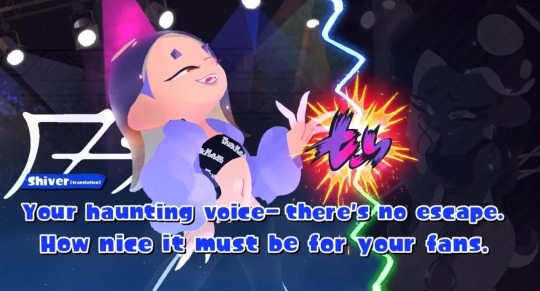
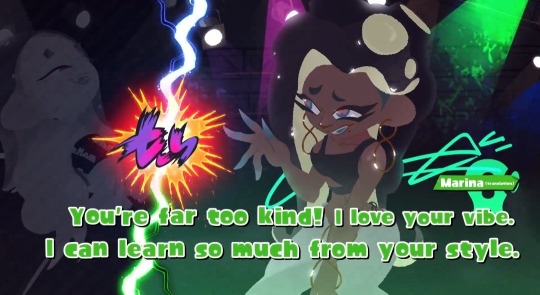
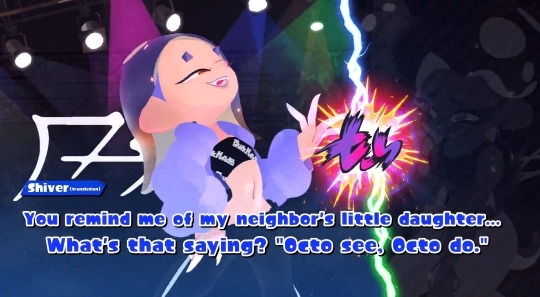
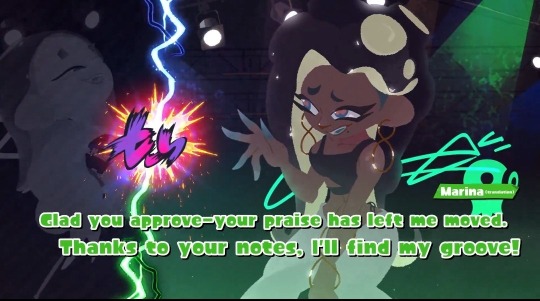
Shiver’s passive-aggressiveness flying right over Marina’s head has gotta be one of my favorite parts of the song ngl.
Shiver is written with the stereotypical Kyoto personality, where they use a lot of backhanded compliments and passive-aggression, which is why that is their style of “dissing”.
Marina, though, is far too earnest to pick up on it, and instead compliments Shiver. Babygirl you are so autistic
#marina ida#shiver hohojiro#splatoon#shiver#marina#splatoon 3#off the hook#deep cut#image#y'all she's a former soldier and famous popstar she's dealt with much worse than Shiver's baby banter#she's also well into her 20s by now she's experienced enough to tell that Shiver wasn't being nice but that killing with kindness was#the most efficient way to win#plus let's be honest if she really was that lost in a rap battle Pearl would intervene#side note but Deep Cut pulling off publicity stunts is amazing and I wish they elaborated on that#and also about the whole part where they hate Inkopolis and despite being friends with people from there have to maintain a certain image#we have the lore to back this up but I'm tired of Deep Cut lore/characterization being implied so much#I mean the fact that groups have to go to Deep Cut to be able to perform on “their” lands is so interesting#and the fact that they felt the need to be defeated instead of simply stating that it's okay is really cool#like can we have their rougher edges be obvious?? I get Nintendo is so pussy that they won't let them be bad guys or have big flaws#but they can't keep giving them crumbs of lore like this if they can't go through with it#also back on topic but again Marina isn't being mean she's at most being a bit catty#like Pearl; her lines are basically “pipe down the grown-ups are busy” but hers are more of a “aw what a sweet attempt! it's okay you might#get me next time <3“#OTH's lines are very well written and we shouldn't dismiss it because Marina is usually a sweetheart#it also makes me think that she's purposefully playing on this because she knows that even if someone gets the double meanings she can get#away with it. just like with this post. we're all “she's too nice to do it on purpose!” but what if she is?? what if that is her way in a l#rap battle? she balances out Pearl's bluntness (ironically like Shiver and Frye balance each other out but they're both mean and aggressive#in general)#I mean short of insulting her; Shiver had no way to win this. she got DESTROYED. and I'm sure if she had been more direct; Marina would have#replied a lot harsher while remaining classy and keeping the high ground
5K notes
·
View notes
Text
The Barbie Movie.
A small, non-comprehensive list of things that stood out to me (spoilers? Kind of?)
The soundtrack
All the jokes that played off of what it was actually like to play with barbies (the pool & ocean being flat, the cups having no drinks in them, the shower having no water, etc.
TRANS BARBIE
The choreography
The "I Am Kenough" tie-dye sweater
Barbies of many shapes and sizes! All very beautiful!
THE ENDING, OH MA LORD. Both the way the story concluded really beautifully, but also the ending joke that no one was prepared for—
Just... everything about Ryan Gosling's performance
Kate McKinnon playing the deranged, "ugly" Barbie
In the same vein, that movie would NOT have been complete without representing the kids who played with their dolls "too hard" (cutting their hair, bending them in weird ways, etc.)
Acknowledging that Barbie did in fact mean a lot to some girls. This movie was geared towards everyone, whether you grew up loving Barbie or hating her.
The mom and her daughter
The fact that when Barbie was starting to become "defective" and/or when she was in the real world, you could start to see her ""flaws"". Like I noticed in some scenes her eyebrows were unplucked and no longer perfectly sculpted, or her skin no longer perfectly smooth with foundation.
It was clear that SO much thought and research was put into this. I couldn't believe how many references there were to specific clothing items, certain playsets, etc.
The fact that Barbie and Ken DIDN'T end up together, and that Barbie DIDN'T indulge Ken in his flirtations (is that a word?) even once
THE FACT THAT I WAS SO CLOSE TO ACTUAL TEARS LIKE SEVEN TIMES???? LIKE WHAT????
The weird dark humor coming out of nowhere
The fact that Barbie never once looked at the human women (who were "imperfect" in comparison to her) with disgust
......the moment between her and the woman on the bench 😭😭😭
The mom's rant about how hard it is being a woman (esp a mother) and how you can never win 🙌🙏
The misogyny in the Real World was so well done. It wasn't overexaggated or over the top it was just NORMAL EVERYDAY LIFE
THE JOKE ABOUT HAVING A MAN SIT YOU DOWN TO TALK ABOUT THE GODFATHER ASDJGKDLW
The moment where I went "OH so THAT'S where the mugshot memes came from"
Ruth Handler <3
The fact that everyone came to the theater dressed either in pink or Barbie-like attire :)
#barbie#barbie movie#barbie spoilers#spoilers#kind of? lol#non-spoiler#barbenheimer#the barbie movie#barbie meme#long post
7K notes
·
View notes
Text
Kabru, impossible mutual understanding & unknowable objects
Despite his concerted and constant efforts to understand other people, it’s established in a few extras that Kabru believes that true mutual understanding between certain different races is impossible. Specifically, between long-lived and short-lived races, and between humans and demi-humans. Partially, we can trace this conviction back to specific hang-ups caused by his life; the trauma of the Utaya disaster, prejudices he carries from his childhood, and his experience of racism among the elves. In this “little” essay, I’m gonna discuss how I think those experiences formed this belief, how it comes out in his actions, and how some of his actions seem to contradict it. The question of whether it’s possible to reach mutual understanding with other living beings despite our differences is one of the core themes of the manga, and I’ll also touch on how this aspect of Kabru’s character links to that.
Seeking understanding
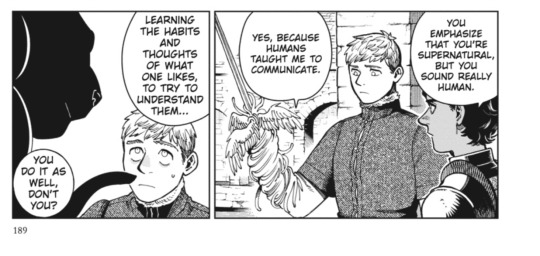
Kabru is a character who devotes a huge amount of time and effort to understanding people, and he is very good at it. In his internal monologue, we can tell how advanced and complex his skills of analysis are. He is able to read a huge amount of information just from looking at people's faces and body language.


People are, to him, what monsters are to Laios. This is something that's been expanded on at length in other, excellent meta. It's the fact that they're foils; it's the fact that Kabru is also very easy to read as autistic, with a special interest which is the opposite and parallel of Laios'. It's something that came out of trauma and alienation, as Laios' special interest in monsters also began as a coping mechanism.
The complicated origin of this "love" for monsters and for people comes through, I think, in the fact that one of the places we see both characters use their fixation is in being very, very good at killing the thing that they love. This also ties into the idea that loving something isn't even remotely mutually exclusive with using it to sustain your own survival; using it for your own purposes; hurting it or killing it. Love can be, and often is, violent, possessive and consumptive. This understanding is part of what makes Kui's depiction of interpersonal relationships so compelling to me.
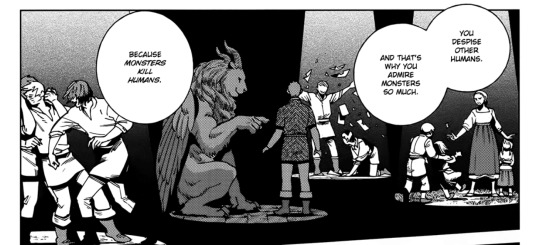
While Laios fixated on monsters and animals to seek a place of escape, in both his imagination and his self-image, from the humans who he couldn't understand and who couldn't understand him, Kabru seems to have fixated on understanding people in order to navigate the complex, socially marginal places that he has been forced into throughout his life. As an illegitimate child raised by a single mother with an appearance that marked him out as different to the point his father's family wanted to kill him, and a tallman child raised among elves who didn't treat him as fully human and wanted him to perform gratefulness for that treatment – treatment that, after he met Rin at age 9, he certainly always understood could be a lot worse – his ability to work out what people wanted from him, whether they were friendly or hostile or had ulterior motives, wasn’t just an interest. It will have been an essential skill.
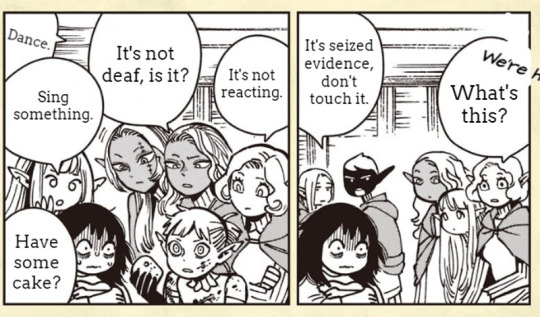
Milsiril, I think, was a flawed parent who tried to do her best by Kabru and did a lot of harm to him despite her best intentions. She may have treated him much better than an average elf would have, but like Otta and Marcille's mother, there are other elves with different outlooks on short-lived races. How would they judge her treatment of him? We don’t have any insight on what it could be, but to be honest, the person’s whose opinion of her I’d be most interested in knowing is Rin’s.
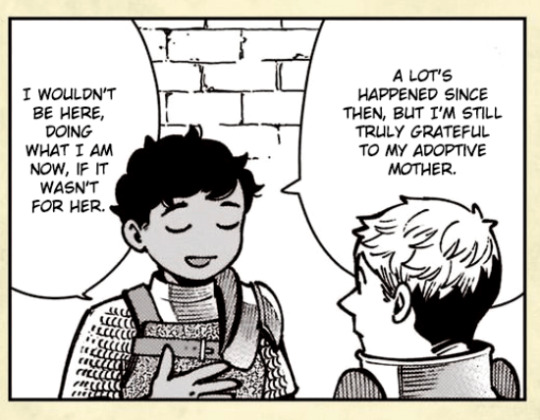
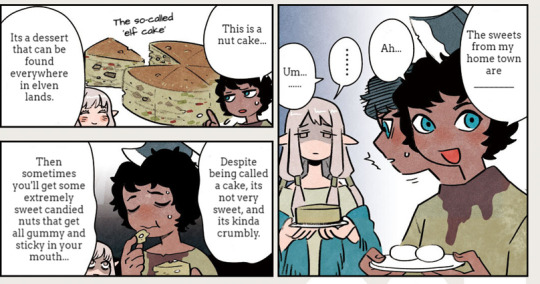
But even if she'd been perfect, living as an trans-racial adoptee in a deeply hierarchical nation with a queen who is a 'staunch traditionalist' who wouldn't even acknowledge the existence of a half-elf like Marcille (according to Cithis) is an experience that would deeply impact anyone.
Elves & Impossible mutual understanding
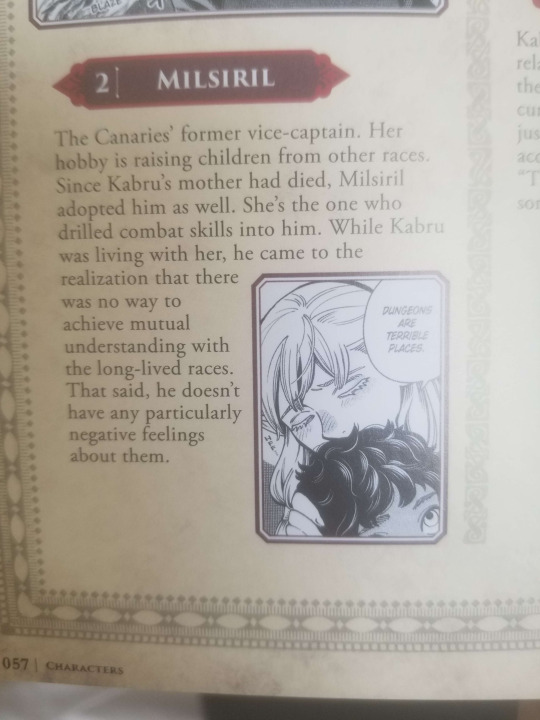
While Kabru was living with Milsiril - in other words, while living in the Northern Central Continent - he came to believe that "there was no way to achieve mutual understanding with the long-lived races."
This is evident in his political project: he wants short-lived races to have ownership over the dungeon's secrets. Despite his dislike of the Lord of the Island, he's a useful bulwark to stop the elves taking over. Despite his doubts about Laios, Laios needs to be the one to defeat the dungeon, because if he doesn't the elves will take over.
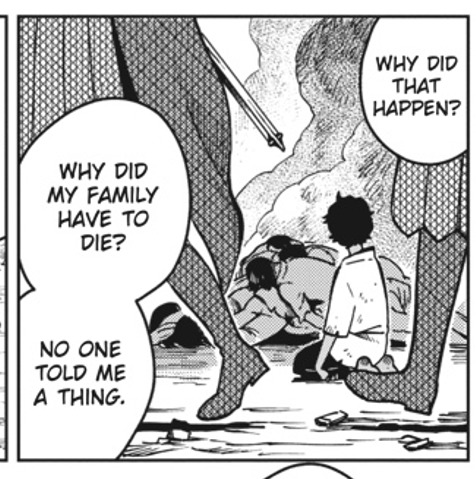
Kabru still carries a deep scar from Utaya, one that was exacerbated by the fact that he never got an answer to any of his questions about what happened or why. This, despite the fact that Milsiril knows about the demon and how it works. Do you think Kabru, with his social perceptiveness that borders on the superhuman, wasn't aware that she knew more than she would tell him?
Given that, the fact that he gets to a place where he "doesn't have any particularly negative feelings about [elves/long-lived species]" .... well, to put it bluntly, I believe that he thinks that's the case, but I kind of doubt it. After all, if he did have resentment, of Milsiril (someone who was his primary provider and caretaker since age six, and who despite her flaws, loves him and who I do think he loves) or of elves (who he has had to play nice with for most of his life, in order to survive, and will still have to play nice with in order to achieve his goals, since they hold all the power) what would that do except hurt him and make his life harder? Kabru is Mr. Pragmatic, so I don't think he'd let himself acknowledge any such feelings he did have. Exactly because he can't acknowledge them, they're well placed to get internalised as beliefs about the Fundamental Unchangeable Nature of the World.
However, these stated beliefs seem to contradict his actions. Despite his belief in the impossibility of forming a mutual understanding, he certainly seems to try to understand long-lived people, just as much as he does short-lived people. There's no noticeable difference between his treatment of Daya & Holm versus Mickbell & Rin that isn't clearly down to their relationship with him. His skills of human analysis were honed and developed while living amongst elves, and as soon as he's alone with Mithrun he immediately sets to understanding him - his interests, his motivations, his needs, and his past.
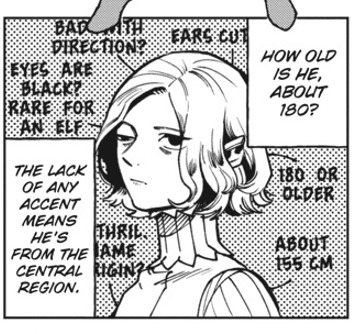
He treats him considerately and without bias, and despite the fact that Mithrun conquering the dungeon for the elves is both a reenactment of a core part of his childhood trauma and a political disaster for his aims, that doesn't seem to colour his perspective on Mithrun negatively at all.
This is something I find extremely laudable about Kabru, and it's another way he parallels Laios. He seems to understand that people, as a rule, (in Laios' case, he understands this about monsters - and eventually, all living beings) will act in their own interests, and if those interests conflict with yours, might harm you. But that's just their nature, and it's not something that should be held against them; you're also doing the same thing, after all. The crux of Laios' arc is precisely that he has to accept the responsibility of hurting someone else in order to achieve what he wants.
Kabru is deeply concerned with his own morals, what he should and shouldn't do, but mostly in the context of responsibility for the consequences - a responsibility he takes onto himself. He isn't scrupulous about what he needs to do in order to create the outcome he wants, but if he fails to create that outcome, then....
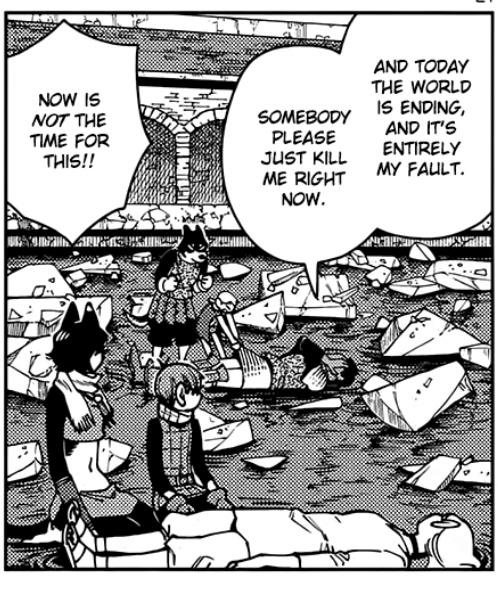
He blames himself to the point of thinking he should die. He doesn't blame Laios, or seem at all angry with him, despite concluding he should have killed him to prevent this outcome. That's because in his eyes, ultimately Laios was going to act according to his own nature, and it's Kabru's fault for not understanding that nature well enough. He's extremely confident in his ability to understand and predict others, (including elves and other long-lived people). Then, where does his conviction that mutual understanding is impossible come from?
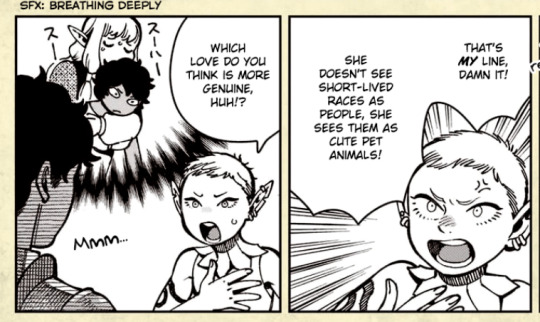
Partially, it's the "mutual" part. I'm sure Kabru, who isn't able or willing to deny Otta's insinuation that Milsiril saw him more like a pet than a son, has felt that his full interiority, the depth of his feelings and his ability to grow, act, and think as a fully equal being, was something that the elves around him just couldn't grasp. Because that was their excuse for it, he came to understand this as a gulf between short-lived and long-lived beings, an inevitable difference in outlook caused by their different lifespans.
This experience might be part of what leads to his iconic “fake” behaviour. He trusts his ability to understand others, but if they aren’t able to understand him, then there isn’t any benefit to being honest about his feelings and thoughts. If his attempts to reach mutual understanding with his caretakers were never able to be fulfilled, then it isn’t any wonder that he reacts with such surprise and horror at blurting out his desire to be Laios’ friend.
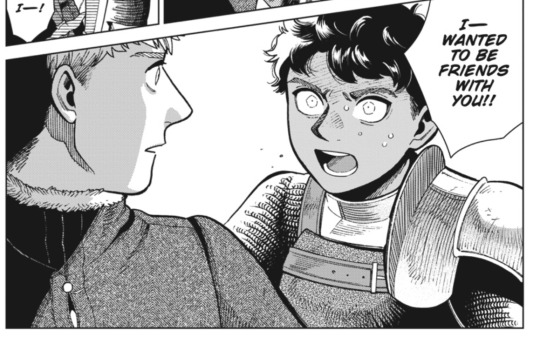
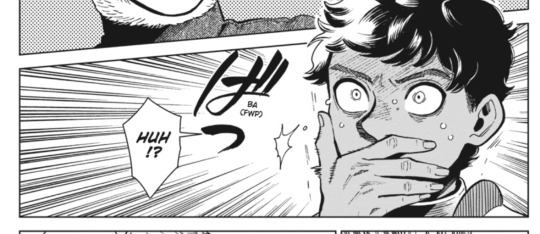
In his experience, making yourself vulnerable in that way only leads to being hurt. Soothing him, hushing him, lying to him, talking to him like a child that isn’t able to use proper judgement – that’s an inadequate and deeply hurtful way to respond to genuine distress, the desire for autonomy, or disagreement. Ultimately, I think that’s why he comes out on the side of being grateful to Milsiril; because she did equip him with the skills and knowledge he’d need to reach his goal, and let him go.
Though he could understand them, they couldn't understand him. To the extent that was true - which I'm sure it was - it wasn't due to anything about lifespan. It was due to the elves’ racism, and the solipsitic mindset & prejudiced attitude that it caused them to approach him with.
Because, if it needs to be said, the idea that there is an unbreachable gap in understanding between the long-lived and short-lived species is not true. Marcille and Laios have a much greater difference in lifespan than any full elf from any short-lived person, and they’re able to understand each other – maybe not perfectly, but better than many other people who are closer in life-span to them.
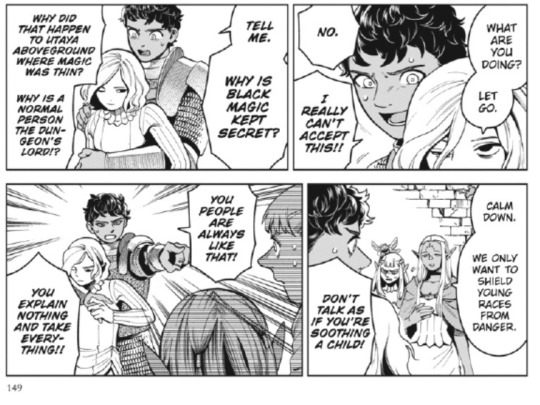
That doesn’t mean that I think Kabru is wrong about this, however. Because there’s an interpretation of his statement that is reflected in his actions and is true. When he talks about his problem with elves, it’s not just their attitudes: it’s their power, and what they use it to do. They “explain nothing and take everything”. Though it’s presented in the guise of ‘guiding and protecting’, in fact it’s a simple case of a powerful nation using their military power, wealth, access to resources, and historically stolen land – including the island itself – to protect their own interests and advance their own agenda. That’s why they’d be able to show up, seize the dungeon, and forcibly take Kabru’s party and Laios’ party to the West. If Kabru wants to stop that from happening, or change that status quo, persuasion or a bid to be understood would be completely pointless. Between the political blocs formed by long-lived species and the interests of short-lived species, “mutual understanding”, given their current, unequal terms, would be impossible. This is something that we see reflected in Kabru’s actions; before he asks his questions about the dungeon, he grabs Mithrun as leverage. He never really attempts to persuade the canaries to see his point of view, because that would be pointless: they’re agents of the Northern Central Continent’s monarchy, and will act in its interests regardless of any individual relationship with him.
I don’t think Kabru sees the different dimensions of this belief of his in quite such clear terms, however, as is evidenced by the other group who he thinks it’s impossible to communicate with.
Demi-Humans & Unknowable Objects
The other place that we see his conviction about the impossibility of mutual understanding is in the kobold extra.
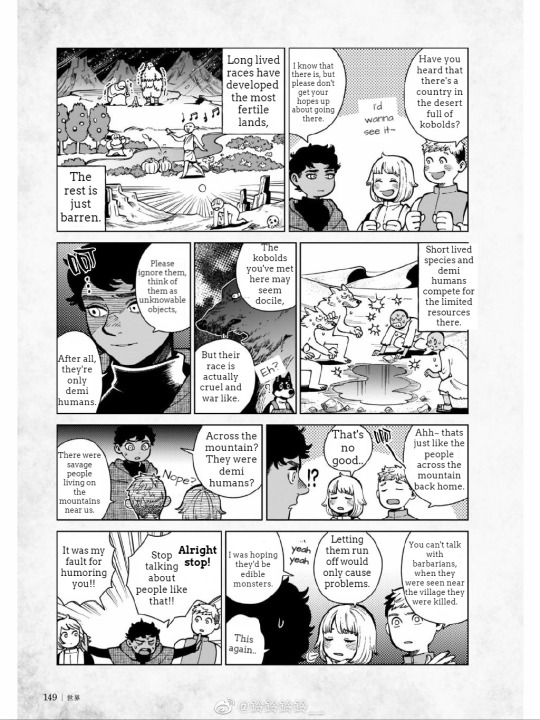
I'm including the whole thing, because I think it's an excellent and clever piece of world-building. Aside from what it says about Kabru, which I'll expand on shortly, what this extra does is deconstruct and call into question the usual "fantasy ontological biology" present in these sort of DnD-like settings. Essentially, the kind of worldbuilding where a race (such as kobolds) can be described as war-like, and that's establishing something essential about their biological nature. That's common to the point that if Kui didn't include this, some people would probably come away thinking that's the case about, e.g., the orcs.
But here, despite what Kabru is saying, the information the reader actually gets is:
the conflict between short-lived humans and demi-humans such as kobolds is mostly over access to material resources that they need to survive.
These resources are scarce because powerful nations, such as the elves, have monopolised them.
Kabru, who has grown up in a place at the centre of these conflicts, ascribes essential, negative traits to a cultural group which was in direct conflict with his own. Communication with this other group is impossible; they aren't people, they're more like objects.
oh yes! just like this conflict between groups of tall-men, a conflict which the reader will immediately interpret as more clearly analogous to real-life racism. Our other protagonists also carry prejudices from growing up in a place where a marginalised group was in conflict with the dominant group over scarce resources. It's definitely impossible to communicate with these people, and you can only kill them.
Woah, when you say it like that, it sounds pretty bad!
But also, nobody walks away having had a realisation or unlearned their prejudices - because they don't have the tools they need to do that work. Yet. I do think, to an extent, it could happen - especially with Kabru, since it's suggested in the epilogue that Melini might become a safe-haven for demi-humans.

To focus in on Kabru, the key here is his statement that you should think of demi-humans as "unknowable objects". Even his extraordinary powers of understanding have seemingly hit a limit. Part of this is just inherited prejudice, and doesn't need to have a complicated psychological explanation, any more than the elves who were prejudiced against him need one.
But also... this is probably somewhat linked to the way demi-humans seem to be considered "pseudo-monsters". They're the place that the strict delineation between the human and the monstrous is permeated. Laios, who is not interested in humans, remembers and is excited by Kuro. Chilchuck and Laios argue over whether it's OK to eat a mermaid. Kabru's prepared to (pretend to) roll with the idea that Laios ate the orcs.
But these are people, aren't they? Of course, this is a social construction, as we see from the fact that in the Eastern Archipelago, the label of "human" is reserved for tallmen, but in most of the rest of the world it depends on some obviously arbirary classification based on number of bones; "demi-humans" aren't in any essential way monstrous, except to an extent in their appearance, and physical location - due to their marginal social status, they're pushed out to live in unsafe places such as dungeons.
Therefore, Kabru's view of demi-humans as fundamentally "other", unable to be understood - monstrous - could be read as akin to abjection, the psychoanalytical concept described by Julia Kristeva. In order to create a bounded, secure superego, that thing which permeates and calls into question the border between self and other, human and animal, life and death, is rejected and pushed to the margin.
“Not me. Not that. But not nothing, either. A "something" that I do not recognize as a thing.[...] On the edge of nonexistence and hallucination, of a reality that, if I acknowledge it, annihilates me. There, abject and abjection are my safeguards. The primers of my culture.” (Kristeva et al., 1984, p. 11) “It is thus not lack of cleanliness or health that causes abjection but what disturbs identity, system, order. ” (Kristeva et al., 1984, p. 13) “The pure will be that which conforms to an established taxonomy; the impure, that which unsettles it, establishes intermixture and disorder. [...] the impure will be those that do not confine themselves to one element but point to admixture and confusion.” (Kristeva et al., 1984, p. 107) (discussing food prohibitions in Leviticus)
This is both (due to its affinity with food-loathing and disgust) a very fruitful concept to apply to dunmeshi, and a psychoanalytical theory which I wouldn't exactly cosign as True Facts About Human Psychological Development. You may also know the abject from its utilisation in the classic essay "Horror and the Monstrous-Feminine" by Barbara Creed - that's a lot more approachable than Kristeva if anyone's interested.
Key here, though, is that through the symbol of the "demi-human" is embodied a step between "human" and "monster" - and that's a prospect that puts at risk the whole notion of an absolute separation between those two categories in the first place. To Laios, that's something wonderful, and to Kabru, it's terrifying. We can see this principle further embodied in the relationship both characters have with the notion of becoming monstrous.
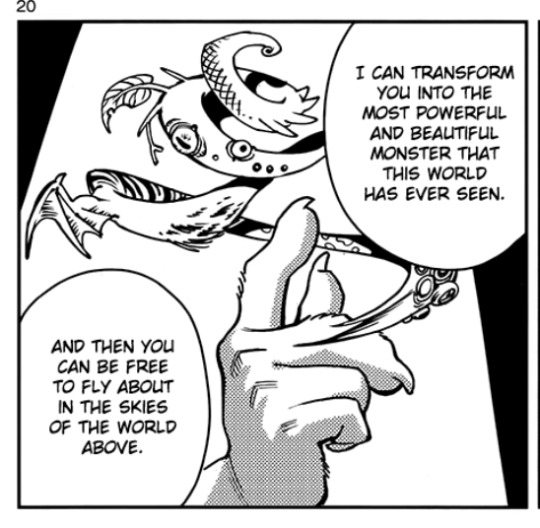
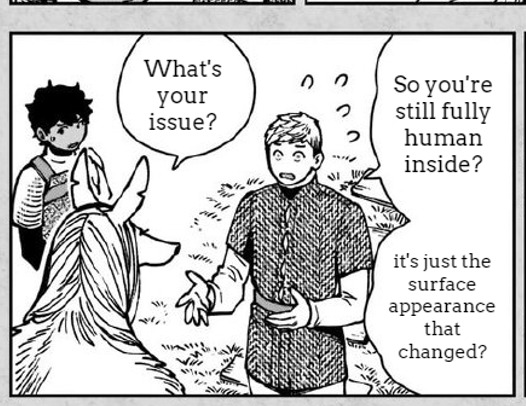
To Laios, this is transcendent, and represents a renunciation of everything human - in fact, if it didn't, it wouldn't "count".
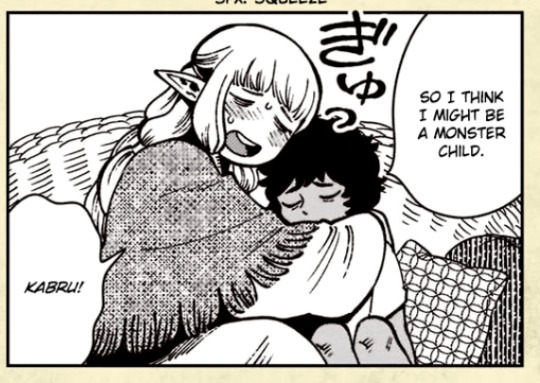
To Kabru, it's a deeply-held fear, established by his childhood alienation (due to his illegitimacy, his eyes, and perhaps also his neurodivergency), deepened by monster-related trauma and the sense of responsibility and survivors guilt he feels for what happened at Utaya. His identity as a human who is not monstrous is key to his sense of stability and safety; he doesn't want to touch monsters, he doesn't even want to see them.
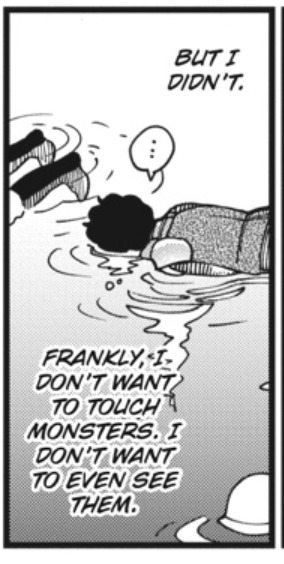
To acknowledge a kinship, a possibility of similarity between the things he loves (humans) and the things he hates (monsters) would be more than touching them - it would be putting them inside him. We know, quite explicitly, that this notion is triggering to Kabru. He literally has what seems to be a flashback when he's about to eat the harpy omelette.
So he abjects it, classifying the demi-human as fundamentally unlike him - an unknowable object, or an object that he refuses to know. Because in understanding it, he would interject the things he hates and fears into his self, which is already, always under threat by that hated and feared object.
Of course, again, Kabru isn't very good at enacting this refusal in practice. For one, when he chooses between his desires and ingesting the feared object, eating monsters... he eats monsters. Part of this is treating himself badly, the "ends justify the means" mentality. His goal is to destroy all monsters, so if he needs to become monster-like to do that, he will. But part of it is also the other motivation that he didn't even seem to know about until he said it: he wants to become Laios' friend, and to learn from him how a person can like monsters. He wants, at least in some part of him, to reconcile the feared and hated object into something he can understand.
For another:
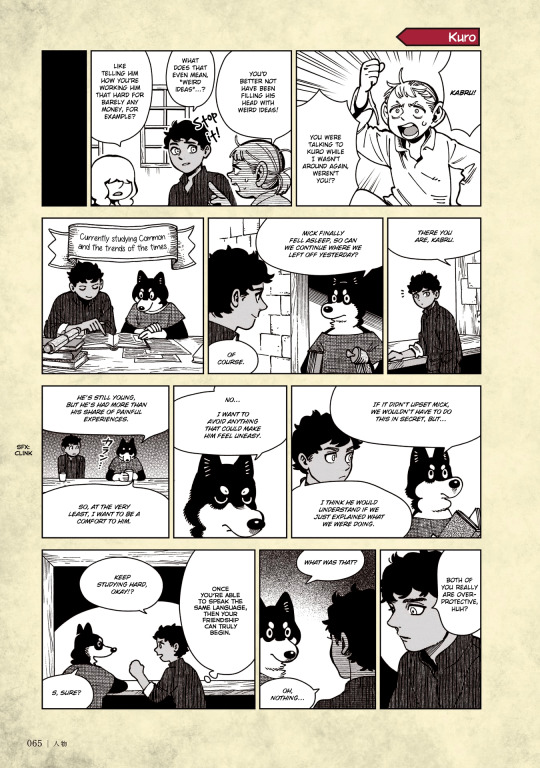
Kabru can speak the kobold language. In the first place, while this may have been common in Utaya, it also could have been something he chose to learn, an early expression of his interest in understanding and talking to all sorts of people. It isn't the kind of thing you learn if you believe that communication between yourself and the group that speak it is impossible, is it?
It's possible to harbour prejudices against a group while being kind to an individual, and given Kabru has those prejudices regardless of his reasons, that is what he is doing. But also, his treatment of Kuro doesn't reflect a sincerely held belief that he's an "unknowable object" at all. His approach is exactly the same as it is to any other person: an analysis of goal and motive, and an attempt to help if he's sympathetic and their goals align - going out of his way to give language and local knowledge lessons in secret. His conviction that Mickbell and Kuro will truly become friends when they can properly communicate is completely contradictory to any sense of demi-humans as fundamentally different, or impossible to reach mutual understanding with. To me, it seems like this self-protective shield against the corruptive force demi-humans as an idea present to his identity, this abjection, when Kabru is face-to-face with one, just simply can't hold up against his finely honed skill of intellectual empathy. Perhaps because he's autistic, it seems his "empathy" is less an emotional mirror response, and more a set of cognitive skills for analysis of others. That instinctual, emotional empathy might not trigger when presented with a member of an out-group, but if it’s possible for Kabru to turn his cognitive empathy off, we don’t see him do it.
This isn't to say that this prejudice doesn't affect his behaviour. For one, it could negatively impact his judgement of politics and policy, where individual people don't enter into it. For another, I'm not convinced he'd be willing to overlook Mickbell's exploitative relationship with Kuro if Kuro wasn't a kobold. As it is, since both of them are satisfied, he doesn't feel like he needs to intervene, regardless of the fact Mickbell isn't paying Kuro. But if Daya and Holm were in a relationship, and Holm took both Daya's and his own share from their ventures, but only compensated her in living expenses and kept the rest, do you think he'd tolerate it, for example? Even if she said it was OK?
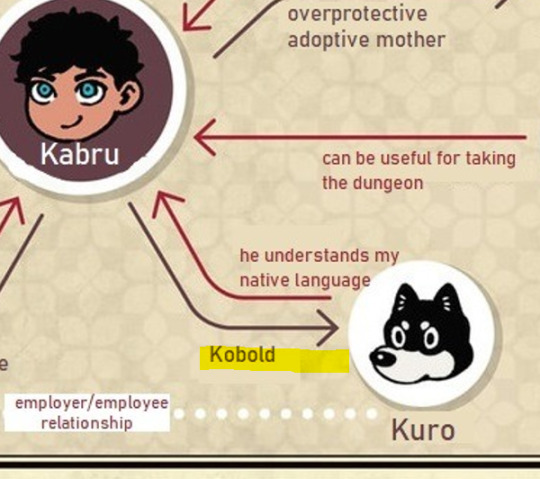
Conclusion

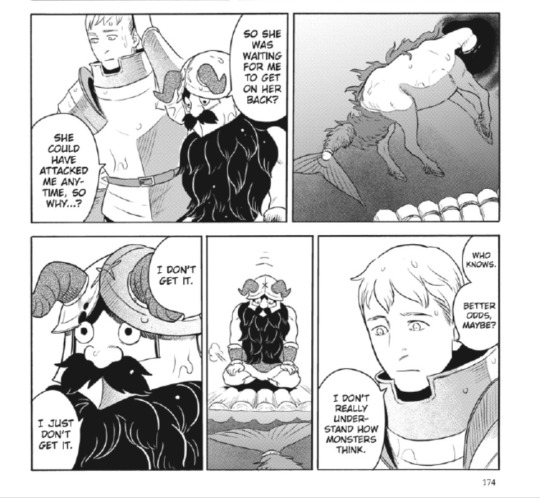
The kelpie chapter establishes that "people can never know what monsters are really thinking." That isn't just true of monsters, though.
True mutual understanding is impossible - between anyone. We can never truly understand another person's heart. This is touched on in, for example, the existence of shapeshifters and dopplegangers. Even a monster that seemed like a perfect copy of a person wouldn’t be that person, and wouldn’t be a satisfactory replacement.
We’re intended, I think, to understand the winged lion's repeated suggestions to just replace people who have been lost with copies as something uncanny, which demonstrates the way that the winged lion never manages to attain a complete understanding of humans. A version of a person who was created to fulfil your memories of them, to be the person who you wanted them to be, would be a terrible, miserable thing.
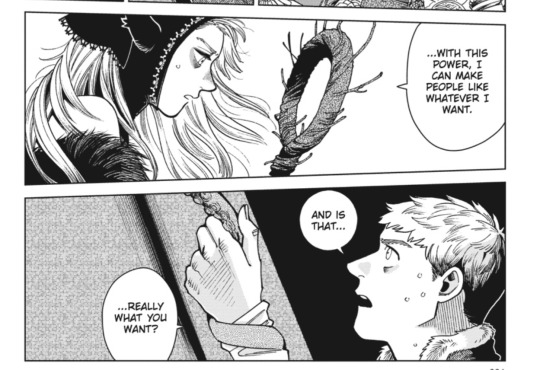
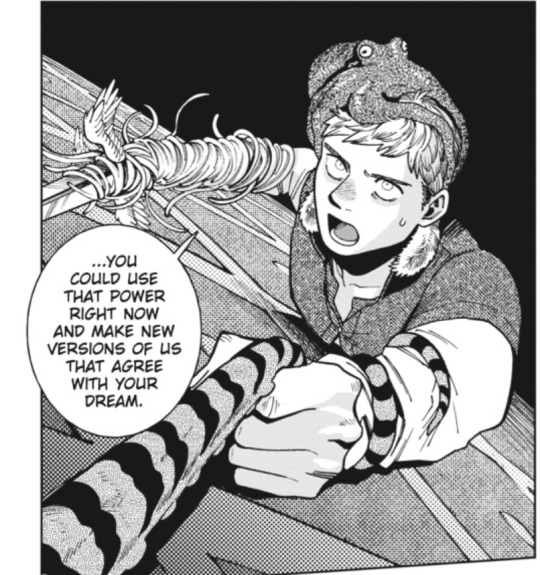

Disagreeing, coming into conflict, and misunderstanding each other, are essential parts of what it means to be living beings, as fundamental as the need to eat.
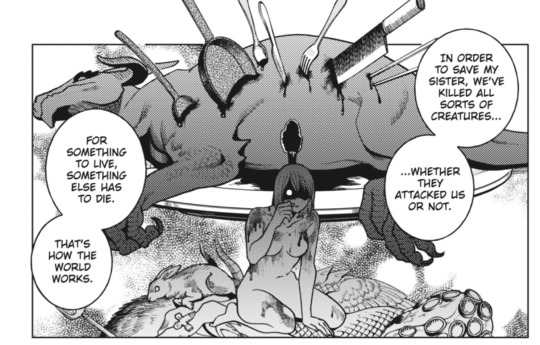
The only thing to do is not to take more than you need to eat to survive, and not impose your own desires onto others. To do your best to sincerely communicate your desires, even if they're embarrassing or vulnerable or strange, like Kabru eventually does with Laios; like Laios does, bit by bit, with the people around him; like Marcille does, Chilchuck does, Senshi does... to hope they will accept you, and do your best to understand them in return.
We can re-examine, in that context, Kabru's line about the elves' tendency to "explain nothing and take everything".
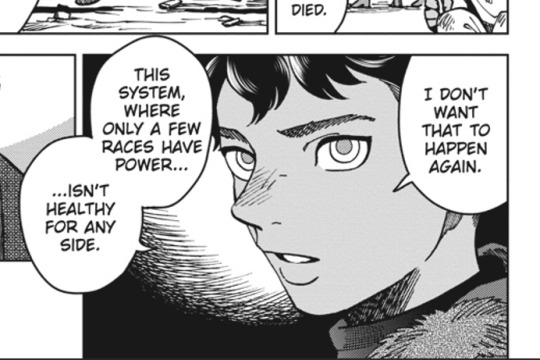
They have the power to impose their preferred "menu" onto less powerful groups. And in that context, mutual understanding being impossible just means that they won't give up their power because they're asked nicely. Kabru's goal is to seize the truth that they won't give to him, and to create a situation where they can't take everything. Because he's accurately surmised that nothing about the treatment of short-lived races will change so long as the power imbalance remains. Despite the way he mistakenly ascribes part of that to "long-lived vs short-lived" or "human vs demi-human", the actual gulfs in understanding he identifies are structural, are about power and about access to material resources and safety.
I think he could come to recognise this. Yaad is teaching him political science after all, and while a prince's lessons on political science won't exactly get at much that's radical or invested in the interests and perspectives of the marginalised (Capital is a critique of for a reason after all...) I believe in Kabru's ability to learn critically and get more from a lesson than it was intended to teach.
#og post#kabru of utaya#kabru dungeon meshi#laios touden#dungeon meshi meta#dungeon meshi#dunmeshi#dungeon meshi manga spoilers#dungeon meshi analysis#kuro dungeon meshi#the canaries#milsiril#continuing to develop my kabru theses.#literally sitting and thinking about kabru all day. rotating him.#he's in the microwave. to me.
2K notes
·
View notes
Note
Do you think the main characters (in aurora)’s fatal flaws can be summed up in one word? If so, what are they?
Yes, but most of my answers only register as flaws if you squint. I think characters are most interesting if their admirable qualities are also what gets them in trouble, and anything becomes a flaw in the right circumstances.
Kendal is selfless. He barely registers himself as a person, so his acts of compassion frequently come at a severe personal cost. He has a massive blind spot for how much it hurts others when he hurts himself. He is kind and lacking in ego, but he has zero ability to advocate for himself. He defines himself by what he can do for others, and is only barely beginning to understand that he can do things for himself.
Alinua is paralyzed. She wants to heal and she does not want to hurt, and she's wrestling with a massive, terrifying power and responsibility that allows her to do both. She spent so long terrified of hurting anyone that she overthinks her actions unless she's running on pure adrenaline and impulsiveness can take over for her.
Erin is independent. He's quicker than everyone around him, and he has no patience for anyone who he sees as slowing him down. He is tremendously powerful and very intelligent, but he has absolutely no ability to work in a team, because that means trusting others to execute his ideas flawlessly, and from his angle, nobody can do that reliably except for him. It's not a logical conclusion, but he can always find a reason for why his plans were foiled by other people messing them up. Erin would love to be helped and rescued. He just knows nobody can, and nobody will.
Falst is loyal. Falst is also unbelievably lonely and, like Erin, has cultivated extreme self-reliance in the face of neglect. Falst loves being part of a team, but has absolutely no ability to trust that he is safe in it. He hasn't been wanted anywhere in a very long time. He's too proud to say that, and he's very angry at the part of himself that is hurt by that, which makes him very volatile in very specific contexts where that part of him is exposed to the air.
Dainix is insightful. He reads people too clearly, but has very little understanding of how much it's okay to plainly say about what other people are thinking and feeling. Where he's from, thanks to the magical influence of Fire, the seat of emotion, everyone can to a certain extent feel the vibes and temperature of the room and everyone is mostly on the same page about it. He is utterly unprepared for people like Falst who become extremely defensive at any insight that prods a sensitive spot, and he's pretty much hopeless at performing any deceit more complex than a half-truth.
Tess is free. She's the ideal of wanderlust, and living her truth is good for her, but it makes her fundamentally unreliable for everyone around her. She cannot be comfortable in stability, and she is ultimately following a selfish goal of pure self-determination that makes it impossible for her to stay anywhere long. She is disconnected from her surroundings and the people who love her. She doesn't like thinking of her loved ones as tethers holding her down, but if she stays anywhere too long, that's what they become.
839 notes
·
View notes
Text
idk if this is a bold take but like, i feel that if jyp was a conventionally attractive old man (the ones people are like daddy? sorry. daddy? sorry), kpop stans wouldn't shit on him that much
#not saying that him or his company are perfect#there are flaws#but mostly of what i see is like haha old man doing things he likes#like i saw a lot of people doing joke videos bc hybe artists were dancing to run bts and jyp artists#were dancing to his recent song. how is that any different?#sure jyp is a ceo and he might have asked (or demanded) his artists to dance to it#but bts are probably just as influential in hybe (not in making decisions but in making the company known) and what if hybe ceos demanded#their artists to do the run bts challenge?#at the end of the day both bts and jyp are performers doing dance challenges for their songs#and like bc of the memes with jyp most people just go with it without even knowing why. just following the trend#like psy isn't conventionally attractive too but i see people respecting him more#idk i'm just rambling at this point
1 note
·
View note
Note
hello miss jade ily! since you’re feeling the marauders right now, may i request something with any of the boys, pre-relationship and too lovestruck to speak? reader has done something innocuous, or she’s literally just standing there, and he can’t not break and smother her?
hello lovely, thank you for your request! ♡ fem, 1k
modern au
You let yourself in quietly. Remus can tell without raising his eyes from his laptop that it's you. James would shout hello, Sirius would beeline for the downstairs bathroom. You close the door with care and leave your shoes under the stairs; Remus can picture you turning your head to one side gently, listening for signs of life.
"James?" you ask.
"Just me," Remus says.
You come around the doorway, beaming at him like he's the one you were looking for the whole time. "Hey, Remus. Don't suppose you know when James is back? He's going to take me to the garage so they don't rip me off."
"Uh, no, but– but I could go with you?" he suggests. Remus isn't your boyfriend, but he wishes desperately that he was and he thinks that's a boyfriend's duty to perform, right? "I'd be happy to."
Your phone dings. You pull it out with a smile. "Oh, it's James," you say, "he's still coming, but he's late. That's fine, I didn't have an appointment or anything. I'd love for you to come if you want, though, baby."
Remus chokes on nothing, clearing his throat and sitting up to not seem so pathetic. "I'll come." Because baby? Baby?!
"Brilliant. How's you writing?"
"Uh, it's, you know, happening. Slowly."
Remus is admittedly much more collected regularly, but your sudden arrival, your smiling, and now your pet name, you've thrown him for a loop. He's doubly thrown when you sit down on the sofa beside him, no polite space, thigh to thigh and close enough to smell the oils in your hair.
"I'm not looking, I promise," you say.
Writing is a raw process. Knowing someone else's eyes are on it magnifies the flaws, but he realises with certainty that he doesn't care if you see it, flaws and all. "That's fine. I don't mind so long as it's you."
"Lucky me," you say.
You take your phone out. Remus doesn't mean to pry but you're right there, and your phone screen brightness is high. The text thread between you and James is open, your thumbs penning a quick response.
Hey James, are we still meeting at the house? I'm omw. 2:17PM
yeah of course, remus is there so go have a cup of tea ill be there soon 2:30PM
ok 2:31PM
sorry running late !! Promise I'll be there, have remus make you a scone :) 2:40PM
I like him too much to have him act like my serf, you can buy us both big salted pretzels on the way home to say sorry for wasting his time 2:45PM
I'm sure he's just gutted to spend time with you 2:46PM
Nice one, James, Remus thinks incredulously. That's exactly what Remus needs, more evidence that he fancies you. You don't seem to have noticed either way, swinging a leg over your knee and finishing another text to James.
I hope not, I love spending time with him 2:48PM
Remus turns to his computer screen, elated and guilty at once. He was not supposed to see that, surely.
"Your word count is really climbing," you say, tucking your phone away. "A hundred and fifty thousand. I can't imagine writing so much… will you have to cut that down?"
"Yep. Much more chance of being published if I fit their standard count. It'll need at least forty thousand words shaved off."
You shake your head. "I can't imagine putting in all that work and then having to put in more work to get rid of it."
"Think of it like refining, instead," he suggests, his fingertip sliding across the laptop's space bar. "I'm making sure nothing is boring."
"I doubt it's boring if you're the one writing it." You stand to his surprise and stretch, a slice of your waist appearing as you twist away from him, an audible click emitting from your back as you roll your shoulders. "Can I make a cup of tea, please?"
You've had a hundred cups of tea in this house.
"You know you don't have to ask," Remus says.
"But it's always nice to ask first," you say as you leave.
He suspects you were talking more to yourself than him as you occasionally do, and he pays little mind to your movements in the kitchen. He has a lot of work to do and not nearly enough time to do it, and editing isn't as simple as cutting away. It's not obvious what needs to go. Remus has to have a deep think.
He gets distracted. When you return he barely notices, busy rewriting a clunky sentence. It's not until your pinky finger brushes his arm that Remus remembers you're here, emphasis on you, and that he's besotted.
When he looks up, he doesn't suppose he'll ever forget again.
You're at his side neatening a plate of biscuits and toasted scones, the very tip of your tongue peaking between your lips in concentration. It's a simple thing, some might even find it unattractive, but you're totally focused on the plate of biscuits, your lovely eyebrows tightly pinched.
You seem upset, for a moment.
Then you meet his eye and any trace of unhappiness vanishes. You're smiling again, eyes alight with something he can't name. "I got you a couple of biscuits and stuff, hope that wasn't too forward. You never remember to eat when you're writing."
"Oh, sweetheart," he says unbidden to himself, hands paused at his laptop, "that's not too forward."
He sets his laptop aside and stands. There's nothing for it, no hold to bar —Remus steps forward to kiss your cheek and squeeze the top of your arm, the kiss swift and the squeeze less so.
"Don't set up around me," he continues fondly, "we'll go have tea in the kitchen with the window open. You can tell me about your day, please. I should've asked you earlier."
"Don't worry, there's nothing important to share," you say, and to Remus' delight, you've visibly flustered.
His hand slides down the length of your arm to your hand, where he holds your fingers in his palm. "If it's about you, it's important. Mm?"
You stare down at his chest and laugh softly. "Okay."
It's a credit to his self restraint that he doesn't kiss you then and there.
#remus lupin x reader#remus lupin x fem!reader#remus lupin fluff#remus lupin x you#remus lupin x y/n#marauders era#remus x reader#remus x you#marauders#remus lupin drabble#remus lupin blurb#marauders x reader#remus lupin imagine#remus lupin fanfic#remus lupin fanfiction#the marauders
3K notes
·
View notes
Text
what i think REALLY works about dot and bubble is it plays with the genre conventions of doctor who itself. We've seen doctor lite episodes like this, we know how they work. There's person who needs to be saved who gets indirect help from the doctor, maybe they're flawed and learn a lesson at the end, maybe they're part of some flawed society that is just kind of set dressing or ends up being torn down at the end without examination. About halfway through the episode I was ready to brush this off as a fun but predictable classic rtd ep that wasn't really anything special. Then from the the betrayal of ricky September on its like watching a house of cards that has been built the entire episode without us noticing collapse into a perfect stack
“Oh well of course you could see them being racist the whole time” the thing is sometimes doctor who is just like that. RTD EPISODES have historically just been like that, either in that they are microagressions in themselves or have bigoted characters/worlds that go unexamined. And I think this episode performed an absolutely insane self aware slight of hand that relies on both you and the writers knowing that doctor who and sci fi in general has a racism problem. The ending recontextualizes things in the episode you may initially have brushed off as an unfortunate BBC or science fiction moment (all white cast, manifest destiny language) as symptomatic of larger societal issues, thus in turn recontextualizing missed moments of bigotry in the shows own history
#editing the post to include my reblog addition in case ppl see it in the tags#LIKE OH MY GOD. OH MY GOD#i think the end could have been. a little subtler with the specific script but seeing as people still dont get the racism and classism WHIL#IT WAS THAT HEAVY HANDED maybe its for the best#me when i saw they were all white in the early part: is this intentional commentary or a bbc casting moment#warlock wartalks#dw spoilers#doctor who
800 notes
·
View notes
Text
HEY, BEAUTIFUL STRANGER — DAN HENG
⋆。˚ ❀ summary: in which you are trying to enjoy the wardance on the luofu, the ipc guards ruin everything, and a beautiful stranger comes to help you. ⋆。˚ ❀ contents: fluff, first meetings (at least in this lifetime…), fem!reader, vidyadhara!reader, reader is anti-ipc uwu, warning for shitty sexist pathetic ipc guards who try to harass reader >:( ⋆。˚ ❀ wc: 1.7k+ ⋆。˚ ❀ a/n: was playing the 2.4 update and this idea was spawned <3 i missed my mans !! was so happy for the dan heng content i can live well again :3 also i hate the ipc so if ur an ipc lover i would scroll past this fic :>
You knew you were capable of defending yourself.
Verbally, at least.
You were once a distinguished Vidyadhara healer in your past life, aiding in the war efforts to heal wounded fighters on the field, and you were no less capable now in your more normal current life. However, being gifted in the Cloudhymn magic that specialized in healing powers did not mean that same strength carried onto the powers that could part seas and send waves crashing down.
In short, while you hoped you could be intimidating and defend yourself when needed, in actuality, your physical prowess…lacked.
Still, you never would have guessed that one of the most humiliating moments in your life would come during a time of festivities at the Wardance when some IPC guards decided to stir up trouble with the unfortunate passerby who accidentally bumped into them on the streets of the Luofu.
And to be clear, you were that unfortunate passerby.
“Hey! Watch where you’re going,” sneered an IPC guard as you tripped in front of them, getting distracted by the bustle of Starskiff Central and not noticing the curb beneath your feet. The guard looked to his friend and shook his head with a scoff. “These people here.”
“How shameful of me to have never known the IPC was full of such charming and chivalrous men,” you said sweetly with a smile dripping of honeyed poison as you pushed yourself off the floor and dusted off your skirt with a swift flick of your hands. “I appreciate you both so much for partaking in the simplest task of helping a fallen damsel and being decent humans.”
The guard who had yet to talk finally spoke up. And you truly wish he hadn’t.
“You know, you could actually be pretty if you didn’t have such an big mouth,” he said, his metallic voice grating your ears as you fought off the urge to roll your eyes. “Maybe I would’ve helped you up if you just sat there and said sorry instead.”
You folded your arms lazily, a yawn coming out of you from having to engage in such a bothersome and useless conversation. Still, you couldn’t help yourself from continuing to bite back. If there was one flaw about you, it was perhaps that your mouth went running off before your brain and legs could catch up.
“It’s rather humorous of you to assume I’d want your help in the first place,” you stated as you looked at the guards’ IPC uniforms in disdain. What business would you want with such pathetic interstellar colonizers? “It is also appalling that you place yourself in such high of a pedestal that you would assume I care about what you think of me.” Before the guards could reply, you flipped your hair behind your shoulder and turned sharply on your heels. “Now, this conversation has taken up too much of my time. I have a festival to enjoy. So, if you would please excuse me—”
You felt a heavy hand grab your elbow to prevent you from walking away. Blowing air out of your mouth, you gritted your teeth and tugged your arm to no avail.
You silently cursed yourself for never taking up martial arts. As much as you liked watching the performances, you personally believed you had seen enough violence in your past life and didn’t see the need to learn any swordsmanship in your current reincarnation.
All your past lives were cursing at your arrogance now, you could feel it. Or perhaps it was just you internally scolding yourself.
How much more badass would it be if you had the strength to easily shove the IPC guard’s out of the way and carry on with the Wardance? Instead, you were like a fly caught in a sticky trap, kicking and fighting with no real chance of escape. It was hopeless and embarrassing.
You felt your face grew hot with humiliation. This is why past you stuck with healing, it seemed.
“Oh, how cute,” the first IPC guard snickered, looking down at you with a patronizing grin. “Look who finally shut up. If I knew some force was all it would take, I would’ve done this much earlier instead of listening to you talk and talk about how much you—”
“Can you finish talking already?” you asked impatiently, tapping your foot on the floor. “You’re too close to me and your breath stinks.”
His grip tightened in anger and you hoped he couldn’t see the grimace on your face from the slight feeling of pain in your arm.
You really did it this time, you thought dryly to yourself. Pissed off the IPC guards just by tripping and opening your mouth. This would be your shortest life yet, at this rate.
Surprisingly, the feeling of pain didn’t last long and a soothing wave of comfort washed over you instead. Your body knew before your eyes could see— A Vidyadhara was around you, helping you. Not only that, but the smallest part of you felt they seemed the slightest bit familiar.
“Is everything alright here?” a cautious, yet firm, voice asked.
You looked up and saw a man step in front of you and swiftly yank the guard’s hand away from your arm. The force seemed minimal and effortless, but you knew this familiar stranger had to be strong to fight the burly guard off so easily.
“That’s none of your business,” scoffed the guard on the left.
Your newfound savior stood resolute and unwavering. “I desire no involvement in your affairs. I only wish to ensure the safety of the Wardance attendees.”
“And you think we’re a threat to safety?” questioned the IPC guard, folding his arms over his chest and frowning. “Seems to me like you’re targeting the IPC. What will they think of the Xianzhou Luofu endlessly bothering the IPC? First, the cargo, now, this.”
The man in front of you simply shrugged. “Believe what you will.” Instead of engaging in the endless bickering any longer, he turned around and offered you a smile. “Would you like me to escort you to the festivities, miss?”
Quirking your head to the side, you grinned back and nodded playfully. “Yes, please! You seem like much better company than these idiots over here.”
“You brat—!”
Eyes widening as the IPC guards began to draw their weapons, you exchanged glances with the grey-eyed man grabbed his wrist, running head first into the crowd and away from the guards with him only a step behind you.
You would be the death of yourself one day, with no one else to blame, you were sure of it. But for today, you escaped happily. With a cute boy in tow. Somehow, you felt like you won this time.
Once you were certain the guards lost you, you finally slowed down to catch you breath, a wide smile on your face when you noticed the man stopping next to you, realizing that meant he dutifully followed you amidst the crowd.
“Thank you for your help…” you trailed off, prompting him for his name.
“Dan Heng,” he introduced with a nod of greeting.
“Dan Heng,” you repeated with a chirp. “I’m not sure if I could’ve removed myself from that situation safely without you.”
He chuckled lightly, shaking his head. “My intuition tells me you would have found a way. Still, I’m glad to be of assistance.”
You looked around at the booths around you. The streets weren’t filled with vendors like Aurum Alley, but it had its fair share of food stalls littered around. The smell of sweet berrypheasant fruit filled your senses as you immediately perked up at the thought of a treat after a tiresome encounter.
“Can I get you a little something to show my gratitude?” you asked, with a hopeful glint in your eyes. For whatever reason, you felt comfort and familiarity around Dan Heng. A remnant from your past lives, you considered. “It’s nothing big! But the best berrypheasant skewers are nearby. This food stall even coats the fruit in melted sugar! You have to try it.”
Dan Heng hummed to himself, as if genuinely considering your offer. “I do have to return to the Palace of Astrum soon, but a short detour for some snacks wouldn’t hurt.” He gave you a small smile as he finally made his decision. “Okay, I will join you.”
You clasped your hands together in excitement, leading him over to the beloved skewers you were talking about.
It took almost getting your ass handed to you by two meathead guards, but at least you managed to meet Dan Heng along the way. Whoever he was.
“Do I seem familiar to you, too?” you blurted without thinking.
His step faltered but he continued on after a brief pause. “It’s vague, in all honesty. But…yes. There’s some sort of subtle tug.”
You noticed his slight tone of discomfort and decided not to press the subject. Even if there was a sense of familiarity between the two of you, it was likely in your past lives. And for some Vidyadhara, they preferred the past stayed in the past. Or, they would at least prefer not to share their past with a completely random stranger such as yourself. While that wasn’t the case for you since you seemed to lack self-preservation, you truly wanted respect that about Dan Heng.
“Cool!” you said simply, quickly changing topics. “Now let’s get some fruit skewers!”
Slightly taken aback, he bit out a noise of laughter and stood in line next to you. “Gladly.”
You looked up at him with a smile. “And maybe, we can get to know some more about each other. Our current lives.”
Dan Heng nodded in agreement. “There is still some time before I have to return to the Express. I would enjoy getting to know you more before then.”
Ecstatic that he agreed, you ordered some fruit skewers and handed one over to him. The two of you happily crunched on the delightful treat and shared a moment of contentment.
You smiled to yourself as you exhaled happily. Dan Heng requested another skewer and shared a piece with you.
Nothing could beat good company and a sweet treat.
For once—just this once—something good came out of the IPC.
#dan heng x reader#hsr x reader#honkai x reader#honkai star rail x reader#den heng x you#dan heng x y/n#hsr imagines#hsr x you#hsr x y/n#honkai star rail#dan heng#hsr fluff#hsr drabbles#dan heng fluff#honkai star rail imagines
500 notes
·
View notes